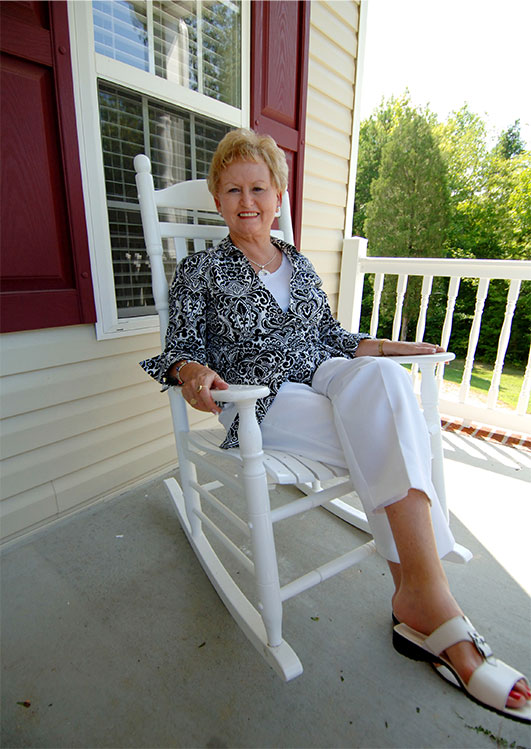by Vance R. Parker JD, MBA | Nov 29, 2020

The author kayaking Pillow Rock rapid on the Upper Gauley river, October 10, 2020.
Now almost 58 years old, I had last kayaked West Virginia’s Upper Gauley river (American Whitewater Class IV-5.0 difficulty rating) in my early 40s. Prior to this year, I had been away from whitewater kayaking 10 years. With boater friends one mist-shrouded morning this last October, I became one with the water again thundering down Gauley gorge.
During “Gauley Season” each fall, the Army Corps of Engineers lowers Summersville Lake on consecutive weekends, opening the outflow tube at Summersville Dam. Newly free epic whitewater charges downriver, as it has for eons. Gauley Season attracts whitewater boaters from all over the United States, with American Whitewater’s colorful Gauley Fest whitewater festival (postponed this year due to COVID-19) rowdily celebrating everything whitewater.
Although the Upper, Middle, and Lower Gauley are physically challenging runs, one notices silver-haired paddlers mixing in with the young pups, eager to run “Insignificant” or “Pure Screaming Hell” rapid one more time. When I was younger, one of our favorite whitewater companions paddled the Upper into his ’80s, always with a big smile on his face.
In our elder law practice a few years ago, my wife Karen and I started noticing that some of our clients we were helping qualify for assisted living admissions were our own ages, or younger, with many of these folks suffering from avoidable illnesses. Without a healthy diet and without enough exercise, our clients had become more susceptible to diabetes, heart disease, or stroke. For clients wanting to “age in place” in their own homes, those who had put on too much weight now had to enter assisted living instead, because their family caregivers were no longer strong enough to help them safely out of bed, or up from a chair. These clients now required the specialized lifts and extra staff attendants that an assisted living facility could provide.
These observations helped motivate me to get back in shape myself. I joined a Crossfit gym, started making healthier food choices, and lost quite a few pounds as I become ready to tackle the Upper Gauley once again.
Vance Parker Law supports healthy aging. I hope that you enjoy my Upper Gauley whitewater video, and that you will get outdoors yourself whenever you can, to create your own healthy adventures…
CLICK THIS TEXT LINK HERE TO WATCH MY RUNNING THE BIG WATER UPPER GAULEY RIVER VIDEO

The author paddling through the froth at Pillow Rock rapid, working to stay “on line.”

Whitewater friends paddling to the Lower Gauley takeout, after completing the 26+ Gauley marathon run (Upper, Middle, and Lower sections), with over 100 Class III to Class 5.0 rapids, on October 10, 2020.
by Vance R. Parker JD, MBA | Mar 18, 2020

(Medical Illustration of an AIDS Virus)
Viruses, as a group, are 1.5 billion years old, predating humans (200,000 years old) by approximately 1,499,800,000 years. Humans live intertwined with viruses in a complex web of life. As one looks at tinier and tinier pieces, the building blocks that make up unbelievably small viruses (RNA, DNA, proteins) are the same building blocks that make up humans.
This relationship, historically, has not always been bad for humans. James Shapiro, a University of Chicago microbiologist notes that “we wouldn’t be here without them.”[i] Researchers speculate that as a part of the evolution of mammals more than 100 million years ago, a viral infection in a primitive mammal uploaded a gene for the protein syncytin that helped the mammalian placenta to evolve.[ii]
Viruses use the protein syncytin to fuse cells together, so that viruses may move from one host cell to the next. In mammals, that very same protein is the actual substance that fuses the placental cells (connected to the fetus through the umbilical cord) with the mother’s uterine cells, allowing vital nutrients to be transmitted through those tissues, and the human fetus to develop and grow.[iii] Without that long ago viral infection in a mammalian ancestor, no human child may have ever blinked their eyes open on a warm summer morning, to greet a bright new day.
Modern humans like to believe that we are in control of most things, but the COVID-19 pandemic has abruptly reminded us that we are still subject to the laws of nature. Although the illness, deaths, and disruption created by COVID-19 may seem unprecedented to modern humans right now, in biological time, periodic waves of both viral and bacterial infections have ebbed and flowed, much like the tides, for as long as humans have existed here on this earth.
But humans have made great progress in preventing, treating, or curing disease, and should continue to do so. When my grandmother Marie Oliver Vance Zipp was born in Texas in 1911, her life expectancy was then 53 years. Her later husband, my grandfather Dr. Raymond Zipp, treated childhood and adult diseases like polio, pertussis (whooping cough), and tuberculosis in the small South Texas town of Edna, Texas, where my mother Valerie grew up, and where I later graduated from high school. These diseases had no effective preventative vaccine, or treatment back then.
A female child now born in 2017 (latest figures available) expects to live for 81 years, 28 years longer than in my grandmother’s time. And the diseases above that my grandfather battled at close range, are now under control in this country. Scientific research has brought us so many more years of life in a relatively short time.
In the early 1980s, my first biology professor at the University of Texas at Austin died of the human retrovirus AIDS while in his 40s, when I was still an undergraduate biology student. Not unlike our 1960s space program that eventually brought us to the moon, the focused time, attention, and money brought to bear against that AIDS crisis eventually yielded great benefits. If my first biology professor had contracted AIDS now, the antiretroviral therapies gleaned from that global research response could have allowed him to live a significantly longer productive life.
With the focused financial and scientific attention now being directed towards COVID-19, we can better respond to this new crisis also, hopefully reducing transmission rates while COVID-19 eventually runs its course. Research advances are already coming. Just this week, my old molecular biology professor at the University of Texas, Dr. Matthew Winkler, announced that one of the biotech companies he founded, Asuragen, has developed molecular diagnostics technology which can now be used to develop more sensitive and accurate COVID-19 molecular diagnostic tests.[iv]
Humans have big brains, with much more capacity than we need for just survival. We have plenty of room to hold worry, and stress, within our extra cognitive spaces, but that can be counterproductive to our health — worry and stress actually depress our immune systems,[v] making us more vulnerable to infections like COVID-19.
The more normal we can make life while it is not normal, the more we can remember things that make us laugh, and the more we can go back to our own personal ways to exercise and reduce stress, the healthier we will be. And when we can feel a little better, the more we will realize that this too shall pass.
REFERENCES
[i] Viviane Richter, What Came First, Cells or Viruses, Cosmos (October 19, 2015), https://cosmosmagazine.com/biology/what-came-first-cells-or-viruses
[ii] Id.
[iii] Id.
[iv] News Release, Asuragen Develops Armored RNA Quant® SARS-CoV-2 Control (March 16, 2020), https://asuragen.com/news-list/asuragen-develops-armored-rna-quant-sars-cov-2-control/
[v] Stress Weakens the Immune System, American Psychological Association (February 23, 2006), https://www.apa.org/research/action/immune
by Vance R. Parker JD, MBA | Nov 22, 2019

WTOB FM/AM Radio in Winston-Salem, NC interviews elder and special needs law, and estate planning attorney Vance Parker as he explains how an asset protection trust should be set up early in North Carolina, to better create a family “nest egg” of assets free from future medical creditors, Medicaid estate recovery, or other future financial problems.
For more information on creating a North Carolina asset protection trust, please see attorney Vance Parker’s article:
Protecting Your Assets With the “StepAPT” Asset Protection Trust
Vance talks with WTOB Radio in Winston-Salem, NC every Tuesday at 4:38 pm, educating the public about elder and special needs law, and estate planning topics.
by Vance R. Parker JD, MBA | Oct 29, 2019

WTOB FM/AM Radio in Winston-Salem, NC interviews elder, special needs, and estate planning attorney Vance Parker as he explains how it does not take much money to better protect your rural North Carolina real property from accident liability risks.
For a published, written version of this article, please also see:
5 Inexpensive Ways for Rural North Carolina Landowners to Lower Their Accident Liability Risks
Vance talks with WTOB Radio every Tuesday at 4:38 pm, educating the public about elder and special needs law, and estate planning topics.
by Vance R. Parker JD, MBA | Aug 16, 2019

Medieval knights of St. John (Hospitallers), riding on bay horses
The basic right of a person to dispose of his or her possessions at death (testamentary transfer) originated in ancient times. The ability for the deceased to then protect the transfer of those possessions against claims by the State or government, or against other creditors, also originated in legal traditions which began hundreds, or thousands, of years ago. North Carolinians benefit from both legal traditions. Our ability to direct our assets and cherished possessions that we collected while on earth to those we wish, may represent our last basic freedom exercised when we leave this world.
The ancient Greek biographer and essayist Plutarch (born approximately 46 AD), attributed the legal reform allowing a person to freely transfer his belongings at death to whomever he pleased, to the Athenian legalist Salon, born about 630 BC.[i] The ancient Romans later developed “fidei commissum” (meaning to commit something to one’s trust), a sophisticated system developed to leave property to one’s heirs after death (testamentary trusts.)[ii]
The English legal scholar William Blackstone explains that the law that developed in many societies gives a real property owner, who occupies a property, the right to peaceably transfer that real property at death, according to his wishes, to another chosen owner and occupier. Blackstone notes that this ordered transition of real property from one owner and occupier to another was necessary “for the peace of society,”[iii] and prevents “an infinite variety of strife and confusion.”[iv]
ORIGINS OF NORTH CAROLINA REAL PROPERTY ASSET PROTECTION LAW
The real property laws transferred to, and now used in North Carolina, were originally developed several hundred years ago within the English feudal system. At that time, the king was the only absolute owner of land, with his lords subsequently holding land from the king. The practice of “wardship” provided that a lord would provide land to a male tenant (where the tenant could grow crops and raise livestock, marry, and raise a family.) In exchange, the tenant provided services such as military service, or “knight service”, to protect the lord and king.[v]
Originally, at the ward’s death, all land reverted to the lord, and the widowed wife and children could then become impoverished. The lords, and kings, eventually learned though that the wards would fight harder for them if the wards and their families were better treated, and thus began to allow the wards to keep the land within their families.[vi] Extended families or clans now developed on inherited lands, that would fight hard for the lord and king.
Because families could now keep their livestock and crops on land that they had a continued right to occupy, widows and children no longer became so impoverished upon the father’s death. More prosperous families meant that the lords and kings now had access to more wealth within their kingdoms which they could tax, in order to fund their extended wars and military campaigns.
Two types of concurrent real property possession developed in feudal England 600 years ago that provided additional financial protection to families. Both joint tenancy (land held by more than one person) and tenancy by the entirety (land held as one unit by husband and wife) landholders enjoyed the right of survivorship (the decedent’s land was automatically passed to survivors), and freedom from the estate creditors of the decedent.[vii]
Joint tenancy, and tenancy by the entirety real property ownership remains alive and well in modern North Carolina. North Carolina law adopts the English common law definitions of both joint tenancy and tenancy by the entirety real property ownership. Here, surviving joint landowners automatically inherit the real property ownership interest of a deceased joint landowner by operation of law, with the surviving joint landowners not legally responsible for any individual estate debts of the deceased joint landowner.
The 1960 North Carolina legal case Wilson County v. Wooten[viii], which held that the welfare departments of Durham and Wilson counties could not attach bank account assets transferred to a beneficiary via right of survivorship, likely protects all right of survivorship transfers (including joint with right of survivorship, or JTWROS, real estate transfers) not otherwise specifically available to estate creditors under NC statutes, from the decedent’s estate creditors.
Wilson County v. Wooten implies that the Executor or Personal Representative of the decedent’s estate (and the creditors of that estate) would have no claim to such transferred JTWROS real property. A more recent 1994 legal case, Miller v. Miller[ix], reconfirms that in North Carolina, JTWROS property is not part of a decedent property owner’s estate, and that the surviving JTWROS property owners take the entire property, free and clear of the claims of heirs or creditors of the deceased JTWROS property owner.
ORIGINS OF NORTH CAROLINA ASSET PROTECTION TRUST LAW
In medieval England, creditor protection additionally became available during the evolution of English trust law. English legal scholars borrowed from the much older Roman fidei commissum trust law, and developed ways to leave property in trust to heirs free from creditors.[x] That refined English trust law, brought to the United States’s original 13 colonies (including North Carolina) from England, was used by founding father Thomas Jefferson to establish an asset-protected testamentary trust for his daughter Martha Randolph. With this trust, Thomas Jefferson left assets to daughter Martha protected from the creditors of Thomas Jefferson’s indebted son-in-law Thomas M. Randolph.[xi]
All 50 states, including North Carolina, have now adopted and enforce English trust law providing various types of asset protection trusts which convey creditor protection to beneficiaries.
ORIGINS OF NORTH CAROLINA CORPORATE LAW PROVIDING ASSET PROTECTION TO BUSINESS INVESTORS
The idea of a “corporation” also developed in medieval Europe. The word “corporation” originates from the Latin corpus, which refers to a group or body of people. The original idea of a corporation, which evolved in medieval European business entities, provided that the corporation would allow a body of people to survive “in perpetuity,” and not be limited by the lives of any single stockholder.[xii]
The Catholic Church was one of the first European organizations that took advantage of a “perpetual existence.” As corporate law later developed in England, the concept of personal asset protection for investors, or stockholders, in risky businesses was first used in the 1600s by the Dutch East India Company. The Dutch East India Company, which issued what were likely the first stock certificates, played a major role in the Western exploration of the entire world.[xiii]
The ability of investors to invest in bold new corporate enterprises while keeping their personal assets safe, which spread from England, through Europe, to the United States (and North Carolina), was significantly responsible for the entire industrial revolution, and for much of the wealth and prosperity that many North Carolinians still enjoy today.
EXPANDED ASSET PROTECTION IN NORTH CAROLINA: BANKRUPTCY LAW, PROTECTED RETIREMENT ACCOUNTS, AND PROTECTED LIFE INSURANCE TRANSFERS
Asset protection ideas originating long ago have spread to other later creditor protection constructs protected by federal and/or North Carolina law. Our current President of the United States has personally benefitted from federal business bankruptcy laws (also available to North Carolina residents) many times, which provided his businesses with a fresh start. Federal ERISA law provides asset protection to funds held within North Carolina residents’ qualified retirement plans, such as IRA and 401K plans.[xiv]
The cash value of life insurance policies which name the insured person’s spouse or children as beneficiaries has long been protected against creditors in North Carolina, with this protection enshrined within the North Carolina Constitution. Life insurance payouts to these beneficiaries, following the insured person’s death, are protected against the insured person’s estate creditors also.[xv]
Most asset protection techniques now available to North Carolina citizens, and protected under federal and state law, have been many, many years in the making. By allowing more families to keep more of their assets, our economy continues to provide jobs and income, our people enjoy a healthier and more successful existence, and our government earns more tax dollars from its more prosperous citizenry, which it can better distribute to our less fortunate.
REFERENCES
[i] Plutarch, Plutarchs Lives: Translated from the Original Greek, with Notes, Critical and Historical, and a life of Plutarach. New York: Derby & Jackson, 1859.
[ii] George Long, Fidei Commissum: A Dictionary of Greek and Roman Antiquities. John Murray, London, 1875.
[iii] William Blackstone, Commentaries on the Laws of England, Book 2, Chapter 2. Boston: Beacon Press, 1962.
[iv] Id.
[v] Peter M. Carrozzo, Tenancies in Antiquity: A Transformation of Concurrent Ownership for Modern Relationships, Marquette Law Review 85, Issue 2, Winter 2001.
[vi] Id.
[vii] Id.
[viii] Wilson County v. Wooten 251 N.C. 667, 111 S.E.2d 875 (1960).
[ix] Miller v. Miller 117 N.C. App. 71 (N.C. St. App. 1994).
[x] Jay Adkisson, A Short History of Asset Protection Trust Law, Forbes, January 26, 2015.
[xi] Id.
[xii] Wayne Patton, Very Old (And Good) Legal Tools, May 4, 2013, https://mwpatton.com/asset-protection-articles/very-old-asset-protection-mechanisms/.
[xiii] Id.
[xiv] 29 U.S.C. § 18.
[xv] N.C. Gen. Stat. § 1C-1601(6); N.C. Const. art. X, § 5.
by Vance R. Parker JD, MBA | Jun 10, 2019

From my earliest memory, my family lived near the water, and as a young boy, I wanted to be just like my dad. How wise he was—how could he know so many things? We always had a small powerboat, and, from the time I was little, my dad was always teaching me how to use it. The ways of the sea, so to speak.
Ropes and knots are a fundamental part of boating lore and safety. The variety of knots that mariners learned time and again from their own dads vary in form and purpose, and are elegantly spare in design. My father taught me to tie knots from the time I can remember being old enough to hold a fishing pole.
In a way, becoming a man used to be a lot simpler. The father spent time with his child, dispensing wisdom slowly, one nugget as a time. The child, a boy in my case, wanted to learn everything.
How do you tie an anchor line? I remember my dad telling me, “that knot can’t slip, son!” He showed me the knot to use to hold the anchor firm. “If the knot slips out, son, the anchor might be lost, and the boat set adrift. The boat could drift into rocks, and crash against them. While the boat is at anchor during the night, if the anchor knot slips, the whole boat can drift away, never to be found again.”
When mooring a boat to a dock, I learned the hard way that if you tie the wrong knot (particularly if the water is rough and the boat is heaving up and down), the heavy boat will repetitively jerk the knot so tight that you could never untie it. Instead, you had to cut the whole rope in two.
“Son, here is how you tie a mooring line to a dock post. If you just wrap the rope around the post several times first, the friction between the rope and the post will hold the boat firm when the swells load up the post. A very loose simple half hitch, easy to untie, is all that is then required to hold the whole assembly together.”
“Here is how you tie the mooring line to the cleat, son. Just a couple of loops around and back this way will do it, then run the last loop under the previous loop and loop it back over the cleat again, so the tension from the boat pulling against the post will hold the rope firm to the cleat, but the line will still be easy to remove when we are ready to go back out fishing…”
“Son, this is how you tie a blood knot to add a swivel when using slick monofilament line. You wrap a lot of loops around the long shaft of the main line, then thread the end back through the hole right above the top of the swivel eye… then tighten up the loops like this… Do you see how this looks like a hangman’s noose? Watch what happens when I wrap the line a few times around my finger, then hold the swivel like this [between my right thumb and index finger], and pull down hard. Do you see how the cinch loops only tighten, and the knot never gets looser? If you tie your blood knot like this, you are not going to lose your fish, no matter how hard he pulls!”
My dad, still young in his 20s back then, was an able teacher, but I didn’t fully understand how wise he was until I was much older. I learned later that at the time that my dad was first teaching me knots, he was driving his little, tan VW Beetle from our West Palm Beach, Florida home far into the Everglades. Deep in the swamp, he was testing powerful prototype SR-71 Blackbird spy plane engines as a mechanical engineer for Pratt & Whitney Aircraft, at its top secret test facility. “We tested those engines outside on test stands” my dad later told me, “where only the alligators and 5 inch wide rattlesnakes could hear. The shock waves were so powerful, they felt like a man beating you in the chest.”
I think all of those engineers and scientists in the SR-71 spy plane program back then intuitively appreciated knots that would hold fast, and would not slip under load, because they were trying to hold fast an entire airframe as it was pushed to speeds never attempted before.
It was the middle of the Cold War, and Francis Gary Powers had been shot down over Russia in our country’s much slower U-2 spy plane. The engineers and scientists designing the SR-71 engine at Pratt & Whitney in Florida, together with those working on the fuselage in Lockheed Martin’s Skunk Works in Burbank, California, knew that they must now launch our flyboys high and fast, hold fast their ship through tremendous heat and pressure, then bring our boys home safely again.
And fly fast those boys did, at over three times the speed of sound, faster than a 30-06 rifle bullet. No SR-71 mission pilot was ever lost or shot down during this plane’s entire operating life.
As I grew older, those strong, steadfast knots I learned to tie early from my father became metaphors for the interwoven life lessons he later taught us by word and example: perseverance through stress… always protect those you love … practice makes perfect…
Fifty years after my dad taught me to tie those first knots, I found myself standing in Stokes County’s Dan River, rescue rope in hand. I had spent years whitewater kayaking with boaters in and around North Carolina, and had been invited to accompany some Sierra Club friends on their annual novice kayak trip down the Dan near Hanging Rock State Park.
One of the trip participants was having a very hard time that day, could barely walk with a hurt knee, and was very cold after successive spills into the river. I did not think that she could swim, at least I had not seen her attempt a stroke. She was sitting down shivering on a rock bar out in the river. A fast current cut off her route to shore, which was washing straight under a downed log, a mortal hazard that whitewater boaters call a “strainer.”
I readied myself to tie a “bowline” knot into my rescue rope, an open rescue loop which the rescue victim needed to put over her torso and under her arms, so we could pull her to safety. The bowline knot had to hold fast under load, and could not slip, because if it did so it could cinch down tight on the victim’s torso or neck, and asphyxiate her.
Although my father had not taught me how to tie the bowline, he had taught me the old way of ropes and knots, and I had everything I needed from him to be successful that day. I silently recited the “Rabbit Story” tool I used to remember how to tie the bowline: “construct the rabbit hole” … “the rabbit hops out of his hole” … “the rabbit hops around the tree” … “the rabbit hops back down his hole” … “the rabbit stops to watch the tree grow”…
The knot did hold fast that day under load, and did not slip. The old mariners’ wisdom had been passed on again, in a way as old as fathers and sons.
by Vance R. Parker JD, MBA | May 28, 2019

WTOB FM/AM Radio in Winston-Salem, NC interviews elder, special needs, and estate planning attorney Vance Parker as he explains how the new North Carolina Uniform Power of Attorney Act (enacted December 2018) may have made your existing financial power of attorney document deficient (or obsolete) for many later elder law, Medicaid planning, or asset protection needs.
Now-deficient powers of attorney, such as the once popular North Carolina Statutory Short Form Power of Attorney that many people still use today, can cause great problems when a person is later diagnosed with a dementia or becomes mentally impaired so that use of the financial power of attorney is needed to make critical financial, legal, Medicaid planning, or asset protection decisions. Such decisions may later be required in order to protect the senior’s home and other assets from Medicaid estate recovery, or from medical creditors. When the senior or disabled person’s financial power of attorney is deficient, key decisions that the agent must make to financially or legally protect the senior may now need to be first approved by the county Clerk of Superior Court, which can be an expensive, time consuming, and unpredictable process.
Adding an inexpensive financial power of attorney document containing detailed elder law powers (an Elder Law Power of Attorney) to one’s estate documents in the first place, while a person is still healthy to sign such documents, can prevent all of the problems caused by the new NC Power of Attorney Act. With an Elder Law Power of Attorney, the senior or disabled person’s agent will have all of the tools (if needed later) to legally protect the senior’s assets, so that critical Medicaid planning or asset protection decisions can be made quickly to save the senior’s home and assets for the senior, spouse, and family, without having to go to the county Clerk of Superior Court for permission first.
Vance talks with WTOB Radio every Tuesday at 4:38 pm, educating the public about elder and special needs law, and estate planning topics.
by Vance R. Parker JD, MBA | Mar 6, 2019

Elder and special needs, and estate planning attorney Vance Parker discusses why good elder caregiving begins in childhood, in his new opinion essay “Who Will Help Me to Age in Place,” published on March 5, 2019 in the Winston-Salem Journal.
To read Vance’s essay in the Journal, please click the following link:
https://www.journalnow.com/opinion/columnists/vance-r-parker-who-will-help-me-to-age-in/article_e1f935ae-3f75-11e9-942e-abc8a85ba074.html
by Vance R. Parker JD, MBA | Feb 13, 2019

WTOB FM/AM Radio in Winston-Salem, NC interviews elder, special needs, and estate planning attorney Vance Parker about how telephone scammers can hit anyone, even a retired FBI and CIA director and his wife. Vance concludes with basic tips for senior telephone and internet safety.
Vance talks with WTOB Radio every Tuesday at 4:38 pm, educating the public about elder and special needs law, and estate planning topics.
by Vance R. Parker JD, MBA | Jan 31, 2019

In the Jan 24, 2019 article “Scamming Grandma: Financial Abuse of Seniors Hits Record,” the Wall Street Journal states that U.S. banks reported a record 24,454 suspected cases of elder financial abuse to the Treasury Department last year, more than double the amount five years earlier. Although it is hard to obtain an exact figure because so much elder financial abuse goes unreported, the AARP frames elder financial abuse as a $40 billion to $50 billion problem within the U.S. Trusts can help.
The United States reports higher rates of elder financial abuse than other industrialized nations. In Europe, seniors’ retirement funds are mostly doled out to them gradually, in monthly payments from government or other pension funds, where they are used to pay monthly expenses. In the United States, because of insufficient monthly Social Security and pension payments, workers are encouraged to save a great deal of their retirement funds themselves, held in potentially large IRAs or other accounts which they control. In fact, according to the Wall Street Journal article and the American Bankers Association, people over 50 represent only one third of the population, but account for 61% of bank accounts, and 70% of bank deposits.
In the U.S., these large pots of money in the hands of seniors (who also exhibit higher rates of illness and cognitive decline) are irresistible to thieves–who can be local door to door scammers, local or long distance romance scam artists, household workers or care providers, nefarious family members, or international financial scam and con artists who reach seniors through telephones, computers, and cell phones. Recent scientific studies reported by the National Institutes of Health tell us that as brains age, they undergo physiological changes that diminish older people’s ability to identify threats and assess the trustworthiness of potential predators. Thieves, of course, discovered these weaknesses long ago.
An elder law or estate planning attorney can create a trust for a senior who is still competent, which figuratively creates a “vault” holding the seniors’ assets, and gives the vault key to a responsible family member or institution. Only this “trustee” can make financial transactions on the senior’s behalf. When predators, such as telephone scam artists, figure out that the senior does not have the key to the vault holding his or her assets, they often quickly lose interest in continuing the scam.
Trusts may also be set up much earlier in life, so that as long as the owner of the assets is mentally competent and not susceptible to predators, the asset owner can act as his or her own trustee and account manager. As the asset owner ages, a co-trustee may be added to help watch the accounts and help the account owner when needed. If the asset owner later becomes susceptible to financial abusers or is no longer mentally competent to manage assets, another responsible family member or an institutional corporate trustee may become sole trustee and manager of the senior’s accounts.
Because trusts may contain detailed, legally enforceable instructions for how a senior’s money is to be used, but financial or durable power of attorney documents typically do not, a trust may be a safer vehicle for managing a senior’s money than a power of attorney. In addition, trusts are more complex, and frequently put together in a lawyer’s office where the trustee can potentially be screened by the drafting attorney. A power of attorney document is often easily downloaded from the Internet, and used by a thief or dishonest family member very quickly, without an attorney’s involvement, to scam a senior.
As banks and financial institutions see higher rates of fraud with powers of attorney, and because trusts are often associated with more affluent clientele, a trustee managing a senior’s assets may be treated with more deference by financial institutions, and experience fewer hassles, than an agent on a power of attorney document.
An elder law or estate planning attorney can help a family determine if a trust is right for their needs.
by Vance R. Parker JD, MBA | Jan 21, 2019

WTOB FM/AM Radio in Winston-Salem, NC interviews elder, special needs, and estate planning attorney Vance Parker about how a caregiver agreement allows a senior to transfer assets to a family member who is caring for him or her, in a way allowed by Medicaid. Without a caregiver agreement, if a senior pays a family member for taking care of him or her and Medicaid is later needed to assist with long term care expenses, Medicaid will often penalize such transfers as a gifts. A significant gift transfer penalty or penalties can jeopardize the senior’s ability to receive government help for long term care.
Using a caregiver agreement represents the best way to document senior payments made to a family caregivers in return for care. Such agreements are recognized by Medicaid if drafted and used properly,
Vance talks with WTOB Radio every Tuesday at 4:38 pm, educating the public about elder and special needs law, and estate planning topics.
by Vance R. Parker JD, MBA | Nov 15, 2018

WTOB FM/AM Radio in Winston-Salem, NC interviews elder, special needs, and estate planning attorney Vance Parker about how to protect your assets before marriage.
Adults of all ages fall in love, and hope to get married. As adults get older, they may accumulate more and more separate property. In my practice, I have worked with clients in their 20s through their 80s who desire to tie the knot. But marriage remains a legal institution (in addition to a religious and emotional institution), thus it is important for couples to understand their separate and marital property rights.
Because love may sometimes be blind, and U.S. divorce rates remain high, here are my 10 Ways to Protect Your Assets Before Marriage.
Vance talks with WTOB Radio every Tuesday at 4:38 pm, educating the public about elder and special needs law, and estate planning topics.
by Vance R. Parker JD, MBA | Nov 14, 2018

WTOB FM/AM Radio in Winston-Salem, NC interviews elder, special needs, and estate planning attorney Vance Parker about using a Medicaid qualified promissory note to shelter assets from Medicaid. Particularly useful with couples, an elder lawyer may transfer an ill spouse’s assets to the well spouse, then use a Medicaid qualified promissory note (authorized under federal law) to loan those assets to someone else, in order to reduce the ill spouse’s estate and qualify him or her for Medicaid. The loan may then be repaid in full, with interest, to the well spouse, so that the ill spouse’s funds stay within the family, and are not lost.
The Medicaid qualified promissory note technique may be used to quickly qualify a senior or special needs person for Medicaid long term care benefits.
Vance talks with WTOB Radio every Tuesday at 4:38 pm, educating the public about elder and special needs law, and estate planning topics.
by Vance R. Parker JD, MBA | Oct 24, 2018

WTOB FM/AM Radio in Winston-Salem, NC interviews elder, special needs, and estate planning attorney Vance Parker about using joint with rights of survivorship (JTWROS) ownership to protect your car from estate creditors after you pass away. If you pass away leaving large medical bills, or had to use Medicaid to help pay long-term care expenses, your car may need to be sold in probate following your death to pay estate creditors.
Owning your car jointly with another person, and adding the right of survivorship to the car title, helps make sure that your car will pass directly to the surviving car owner out of probate, and free of estate creditors.
Vance talks with WTOB Radio every Tuesday at 4:38 pm, educating the public about elder and special needs law, and estate planning topics.
by Vance R. Parker JD, MBA | Oct 22, 2018

WTOB FM/AM Radio in Winston-Salem, NC interviews elder, special needs, and estate planning attorney Vance Parker about using a life estate deed to protect your home or other real property against future high healthcare bills or other unknown creditor costs. A life estate provides the life tenant with an enforceable legal right to remain in his or her home for the rest of their life, in a way that is protected against attachment by any future medical creditors, or other creditors. An heir or loved one can serve as the real property remainder interest holder–which can insure that the loved one inherits the real property free of creditor problems.
Vance talks with WTOB Radio every Tuesday at 4:38 pm, educating the public about elder and special needs law, and estate planning topics.
by Vance R. Parker JD, MBA | Sep 19, 2018

WTOB FM/AM Radio in Winston-Salem, NC interviews elder, and estate planning attorney Vance Parker about how forming a third-party special needs trust may be an excellent way to save protected funds for your child (or other important beneficiary in your life.) A third-party trust may protect against future creditors of both the parent and child, does not disrupt your child’s Medicaid, SSI, or other public benefits, does not have a government payback provision, and can benefit other family members if your child passes away. The trust may benefit your child right away, during your life, and may also provide a protected “nest egg” of assets for your child if you pass away.
Vance talks with WTOB Radio every Tuesday at 4:38 pm, educating the public about elder and special needs law, and estate planning topics.
by Vance R. Parker JD, MBA | Sep 11, 2018

WTOB FM/AM Radio in Winston-Salem, NC interviews elder, special needs, and estate planning attorney Vance Parker about why your assets may be subject to probate creditors after you pass away in North Carolina, and how probate creditors may keep assets that you will to your loved ones from benefiting them. Vance then discusses a number of different types of assets that you can use to avoid probate creditors.
Vance talks with WTOB Radio every Tuesday at 4:38 pm, educating the public about elder and special needs law, and estate planning topics.
by Vance R. Parker JD, MBA | Aug 7, 2018

WTOB FM/AM Radio in Winston-Salem, NC interviews elder, special needs, guardianship and estate planning attorney Vance Parker about how to make planning decisions for your special needs child before he or she becomes an adult at age 18. If appropriate, and your child will not be competent to make his or her own financial, legal, health care, and housing decisions as an adult, guardianship proceedings may be established for your child in North Carolina starting at your child’s age of 17 1/2, Full general guardianship, and alternatives to full general guardianship (for children who may be able to live as adults on their own) including powers of attorney, and partial guardianship (guardianship of the estate only) are discussed. Because it is important to allow a child as much freedom as possible to promote continued intellectual development, and to support a sense of independence and self-worth, guardianship or alternatives should be carefully-considered family decisions, which can be supported through advice from a special needs and guardianship attorney.
Vance talks with WTOB Radio every Tuesday at 4:38 pm, educating the public about elder law, and estate planning topics.
by Vance R. Parker JD, MBA | Jul 12, 2018

WTOB FM/AM Radio in Winston-Salem, NC interviews elder, special needs, and estate planning attorney Vance Parker about why it may make sense to protect your pet with a pet trust. Because animal shelters are facing a crisis of unwanted pets from incapacitated seniors or seniors who have passed away, pet trusts provide a legally enforceable way to protect your pets should something happen to you. Pet trusts are protected under North Carolina law, and may be easily added to a standard will or revocable trust document.
Vance talks with WTOB Radio every Tuesday at 4:38 pm, educating the public about elder and special needs law, and estate planning topics.
by Vance R. Parker JD, MBA | Jul 3, 2018

WTOB FM/AM Radio in Winston-Salem, NC interviews elder, special needs, and estate planning attorney Vance Parker about using a Medicaid Compliant Annuity (protected by federal law), to shelter assets when applying for Medicaid. When applying for Medicaid coverage of nursing home, assisted living, or home care expenses, it may be necessary to make assets non-countable in order to meet Medicaid’s strict applicant asset restrictions.
The Medicaid Compliant Annuity (MCA) technique may be particularly useful for making assets non-countable within retirement accounts.
Vance talks with WTOB Radio every Tuesday at 4:38 pm, educating the public about elder and special needs law, and estate planning topics.
by Vance R. Parker JD, MBA | Jul 3, 2018

WTOB FM/AM Radio in Winston-Salem, NC interviews elder, and estate planning attorney Vance Parker about how to use a special needs trust to keep an inheritance or other financial award from disrupting a senior or person’s Medicaid or disability benefits. Vance further explains why it is critical to make sure that any assets “willed” to a spouse diagnosed with dementia, or any assets left for a child, be distributed through a trust for the disabled beneficiary.
Vance additionally discusses when adult guardianship of a special needs individual may be appropriate.
Vance talks with WTOB Radio every Tuesday at 4:38 pm, educating the public about elder and law, and estate planning topics.
by Vance R. Parker JD, MBA | Jul 3, 2018

WTOB FM/AM Radio in Winston-Salem, NC interviews elder, special needs, and estate planning attorney Vance Parker about the most effective estate planning for a senior (or younger person) diagnosed with a dementia or disabling illness. Click below to play the attached audio file and listen to the interview.
Vance talks with WTOB Radio every Tuesday at 4:38 pm, educating the public about elder and special needs law, and estate planning topics.
by Vance R. Parker JD, MBA | Jun 18, 2018
Categories: Elder law, veteran, veterans, veterans’ law, VA law, VA planning, estate planning, Aid and Attendance, veterans’ planning, Medicaid planning, Winston-Salem, North Carolina, NC.
 According to a study by the RAND Corporation, an estimated 5.5 million family caregivers provide care for ill or disabled veterans in the United States. That’s 5.5 million people who are sacrificing time, energy, and money to provide care for veterans they love, as these veterans recover or age.
According to a study by the RAND Corporation, an estimated 5.5 million family caregivers provide care for ill or disabled veterans in the United States. That’s 5.5 million people who are sacrificing time, energy, and money to provide care for veterans they love, as these veterans recover or age.
Family caregivers have been saving the government money by providing care to veterans that expensive medical professionals would normally perform, and the VA is recognizing this fact. Lawmakers have approved reinforcing and expanding the VA Caregiver program, through the VA Mission Act, which expands caregiver support to benefit pre 9/11 veterans, in addition to post 9/11 veterans. The VA Mission Act, which authorizes $860 million in veterans’ caregiver support over the coming years, was signed into law on June 7, 2018.
As these programs become implemented and available, ill or disabled veterans will be able to apply to a VA program to support those who are caring for them.
For many veterans, aging is not an easy process. In the words of Brad Barton, a Vietnam Veteran whose spinal cord was severed from a mortar round during the Vietnam War’s Tet Offensive: “I want to see veterans treated equally. We all served our country when our country needed us, and now we need their help. And I think they should do this for us.”
At a time where the number of people who need care is increasing, and the number of caretakers is decreasing, this bill may provide an example for eventually providing caregiving financial support to non-veteran families.
Veterans and their families should make certain that they receive all VA support benefits available to them. Programs such as Aid and Attendance and Housebound benefits may add valuable funds to a veteran’s pension which can be used to help with home care or assisted living expenses. An elder law attorney can provide VA asset planning services to help veteran families qualify for and receive all available veterans home support and long-term care benefits.
SOURCES
Quil Lawrence, VA Bill Set to Expand Support For Veterans’ Caregivers, NPR NEWS (May 23, 2018), https://www.npr.org/2018/05/23/613596970/va-bill-to-expand-support-for-veterans-caregivers
National Academy of Elder Law Attorneys (June 14, 2018), https://www.naela.org
Susan Collins, U.S. Senator from Maine, Press Release: Senate Appropriations Committee Approves $860 Million for Veterans Caregiver Support Program (June 8, 2018), https://www.collins.senate.gov/newsroom/senate-appropriations-committee-approves-860-million-veterans-caregiver-support-program
by Vance R. Parker JD, MBA | Jan 2, 2018

CATEGORIES: Elder Law, Special Needs Law, Winston Salem, North Carolina, NC.
Family caregivers may provide essential care to disabled seniors, or to special needs/disabled adults of any age. Such family care may allow the senior or special needs adult to remain in the home environment that he or she prefers, and can provide numerous other benefits.
If the senior or special needs adult has available funds, it may make sense for them to pay the family caregiver for those services. But if the disabled adult may need future Medicaid benefits, improperly documented transfer of the disabled adult’s assets to a family member (to compensate for care services) may be viewed by Medicaid as a sanctionable gift transfer. Such transfers violate Medicaid’s 5-year lookback provisions, which penalize the disabled adult for any gifts made during that time.
Family Members May Create Valid and Enforceable Contracts With Each Other
Our federal and state legal system allow family members to create valid and enforceable contracts with each other.
Likewise, Medicaid (and other public benefits programs) also allow a disabled adult to transfer assets to a family caregiver in return for services. Specifically, the Health Care Financing Administration (HCFA), in Transmittal No. 64, Section 3258.1.A.1., provides that relatives and family members can be paid for care provided to loved ones, and that such payment shall not result in a penalty period, provided that fair market value compensation has been paid to the caregiver for the services rendered. A written agreement, which should already be in place at the time care services are provided, is suggested as acceptable proof of such an arrangement.
Types of Services Documented by a Care Agreement
Care agreements (caregiver agreements) are quite flexible, and can be tailored to meet client needs. An elder law attorney who structures a care agreement for a disabled adult (the “Principal” in the agreement) may include the following types of care services to be provided by the “Caregiver”:
- Monitoring physical and mental health;
- Finding, providing, and managing appropriate medical and dental care providers;
- Providing assistance with activities of daily living (ADLs), such as bathing, toileting, continence, dressing, feeding, and transferring;
- Providing personal hygiene services such as assistance with haircare, shaving, fingernail and toenail care;
- Assisting with personal shopping;
- Providing nutrition and meal services;
- Providing laundry services;
- Providing housecleaning services;
- Providing visitation, socialization, and entertainment services;
- Providing social services advocacy, and government services advocacy;
- Serving as a spokesperson;
- Providing financial management services.
Real Property Upgrades, Rent, Utilities, and Upkeep
If the disabled adult is living within the caregiver’s home, the following types of non-caregiving provisions may be added to the care agreement, in order to provide compensation documentation for other benefits provided by the caregiver to the disabled adult:
- Reimbursements for improvements made to the home in order to accommodate the disabled adult;
- Rent proportional to the amount of the residence occupied by the disabled adult;
- Proportional compensation for utilities and housing upkeep costs.
Tax Issues
The IRS and the NC Department of Revenue normally view the caregiving relationship formally (as an employer/employee or employer/contractor relationship). Funds received by the caregiver are typically classified as taxable income, with the disabled adult potentially subject to employer rules and procedures with respect to reporting, compensation, and taxes.
A family using a care agreement (or entering into a compensated care relationship) should seek ongoing advice from a CPA or other appropriate tax professional, with respect to the care agreement and employment relationship.
Fair Market Value
As mentioned above, the compensation to the caregiver must be set at fair market value for the services performed. The caregiver should keep and maintain a daily journal detailing the care he or she provides to the disabled adult, noting the time spent on each activity.
Other Benefits
Social Security Credits
A family member who either leaves outside work (either wholly or partially), or does not seek work, in order to care for a disabled relative may then stop receiving Social Security work credits. Such credits may be essential to maximizing Social Security retirement benefits for the caregiver.
In using a care agreement, where a caregiver consistently reports to the IRS her income received for taking care of a disabled relative, the caregiver keeps adding Social Security credits to her employment record. This helps insure that the caregiver will maximize her Social Security retirement benefits as much as possible.
Transparency for Other Family Members
It is common for only one family member to serve as primary caregiver for a disabled adult. A care agreement can reward the family caregiver for her time and effort. In addition, the care agreement helps clearly document how the disabled adult’s money is being spent on caregiving, so that all family members can better understand the care relationship, in a way that can prevent family disagreements or misunderstandings.
References
ElderCounsel
Andrew Olsen, Caregiver Agreements and Elder Care Mediation, in Top Elder Care Planning Strategies, (2016).
by Vance R. Parker JD, MBA | Dec 27, 2017

CATEGORIES: Elder Law, Medicaid Planning, Winston Salem, North Carolina, NC.
Many individuals or couples must apply to Medicaid to finance nursing home or other long-term care costs. Medicaid planning allows an individual or couple to shelter their assets from Medicaid, while simultaneously “spending down” to meet strict Medicaid asset requirements.
When a Medicaid applicant must move quickly to spend down assets, a properly drafted Medicaid Promissory Note may preserve valuable funds for the applicant(s), rather than losing these assets to pay for facility costs.
Congress Created a “Safe Harbor” With Respect to Medicaid for Drafting Promissory Notes
Congress, in passing the federal Deficit Reduction Act (DRA) of 2005, provided legislative permission for Medicaid applicants to use “Medicaid-qualified” promissory notes. As long as a promissory note meets the following requirements, it will be viewed as a permissible compensated transfer, and not penalized as a gift transfer. Such Medicaid qualified promissory notes must be:
- Irrevocable, and cannot be cancelled if the lender dies
- Divided into equal payments
- Payable within the lender’s actuarial life expectancy
The North Carolina Medicaid Manual, which Medicaid caseworkers use to evaluate Medicaid applicants, is consistent with federal law in allowing properly drafted promissory notes.
The Medicaid Promissory Note technique for sheltering assets from Medicaid was upheld in federal court in Lemmons v. Lake (U.S. Dist. Ct., W.D. Okla., No. CIV–12–1075–C, March 21, 2013). Juanita Lemmons, a resident of Oklahoma, transferred her Edward Jones account and her farm to her son, in exchange for a promissory note in the amount of $86,400, before applying for Medicaid benefits in Oklahoma. The State of Oklahoma Medicaid agency denied resident Juanita Lemmon’s Medicaid application largely because it ruled that the asset transfer was a “sham transaction.” The Oklahoma federal district court overruled that decision, holding that Mrs. Lemmons’ asset transfer was not a sham transaction, because an enforceable promissory note governed and memorialized the transaction.
How the Medicaid Promissory Note Works
The basic promissory note concept is pretty simple: the Medicaid applicant, or her spouse, acts like a bank “lender,” making a loan for the full (or partial) amount that Medicaid requires her to “spend down” in order to qualify for Medicaid. The “borrower” must be a non-spouse third party, such as a child. Both lender and borrower sign the loan document, called a Medicaid Promissory Note, where the borrower agrees to pay the Medicaid applicant back every month at the same monthly rate, over a scheduled period of time, with interest.
Here is an example of how the Medicaid Promissory Note works:
Married Mom, Jenny, suffers from congestive heart failure and has received an FL-2 form from her physician stating that she requires “SNF”, or Skilled Nursing Facility care, a medical term for “nursing home” care.
Jenny and her husband Tom have very modest assets and decide that they need to apply for Medicaid, before she can commit to the nursing home (which costs $7,000/month).
Jenny moves her assets over to her husband Tom, as allowed by Medicaid. When Jenny and Tom apply for Medicaid assistance, their Medicaid caseworker determines that Tom holds $4,600 more assets than his Medicaid Community Spouse Resource Allowance (CSRA) allows.
Thus, in Medicaid terms, Jenny and Tom are $4,600 “over resource”, meaning that they have $4,600 too many countable assets for Jenny to be accepted by Medicaid. Medicaid may then direct the couple to “spend down” the $4,600 (which could mean private-paying this money to Jenny’s nursing home in the first month). Unfortunately, however, once Jenny and Tom use the $4,600 to pay the nursing home, the money is gone to Jenny and Tom and can no longer benefit them personally.
Instead of losing the $4,600 to the nursing home, Jenny and Tom could instead choose to preserve those assets for their later use, or her family’s later use, by using the Medicaid Promissory Note to shelter those assets from Medicaid. Since Tom now holds the couple’s assets, he asks his elder law attorney to set up a Medicaid Promissory Note for a $4,600 loan amount to Tom’s (and Jenny’s) son Chuck.
The attorney determines that Tom’s actuarial life expectancy (Tom is 82 years old) is 8.58 years, and also determines an IRS-appropriate lending rate for intra-family loans at 2.54%. He structures a 96-month loan (a loan term within Tom’s actuarial life expectancy), where the $4,600 Tom loans to Chuck will be paid back by Chuck to Tom at a rate of $53.00/month ($52.95 principal + $0.11 interest.)
The IRS will count $0.11 of each month’s payment as Tom’s earned interest, with $52.95 of each month’s payment a non-taxable return of loan principal. The IRS will require Tom to report the interest payments he receives from Chuck as taxable income.
When Tom and Chuck sign the Medicaid Promissory Note, Tom writes a check to son Chuck for $4,600, which Chuck deposits in his bank account. Because the Medicaid Promissory Note represents a market interest rate compensated transaction, it is not a gift under Medicaid’s 5-year lookback rules, making the Medicaid Promissory Note a quick and easy “last minute” method of sheltering assets when applying for Medicaid.
Under standard accounting rules, the funds that Chuck owes Tom would normally remain Tom’s assets (Tom’s note receivable and Tom’s interest receivable.) Medicaid does not follow standard accounting rules regarding certain types of loans, such as the Medicaid Promissory Note, however. Under Medicaid rules, once the Promissory note is signed, the $4,600 is no longer the lender’s (Tom’s) asset. Thus Tom and Jenny can use this technique to remove $4,600 from their net Medicaid countable assets.
Jenny and Tom have thus saved $4,600 for their use that will not be lost to a facility payment. Because the Medicaid Promissory Note has constructively created an immediate spenddown for the $4,600 that the couple was over resource, their net countable assets have now been lowered by $4,600, so that Jenny can now be accepted by Medicaid. Thus, Medicaid will be then responsible for paying the $4,600 facility fees, not Jenny.
In another departure from standard accounting rules, the entire stream of monthly return of loan principal and interest income payments that Tom receives from son Chuck will all be cumulatively viewed by Medicaid as “income” to Tom. But because this will be the “community spouse’s” (Tom’s) income, not the applicant spouse’s (Jenny’s) income, this “income” can be saved by the couple, and will not be required to be spent on facility fees.
The 2005 DRA requires that the Medicaid Promissory Note cannot be cancelled at the lender’s death. Thus, if Tom dies before the 96-month loan term has ended, Chuck technically still owes the loan principal and interest balance to Tom’s estate. This note may never be called following Tom’s death, however, because North Carolina probate rules have very specific requirements and deadlines for creditors’ claims. These deadlines frequently are missed by creditors of small or insolvent estates.
by Vance R. Parker JD, MBA | Nov 28, 2017

CATEGORIES: Elder Law, Medicaid Planning, Estate Planning, Creditor Protection, Asset Protection Trust, Irrevocable Trust, Trusts, Advance Planning, Winston Salem, North Carolina, NC.
An irrevocable Asset Protection Trust (APT) may be used as part of an advance asset protection planning strategy, to help a client create a “nest egg” of assets to be passed to his loved ones free from the claims of unforeseen future creditors. Such trusts can help protect estates against large future medical care bills, such as bills from Medicaid Estate Recovery, hospital, or nursing home bills, or other unforeseen future liabilities such as legal liabilities, auto accidents, financial liabilities, bankruptcy, or can provide financial protection from nefarious family members.
In order to create an APT free from unknown future creditors in North Carolina, the trust must be designed so that the trust grantor, who sets up the trust, does not benefit directly from the trust assets. The trust beneficiaries, however, may benefit from APT assets during the grantor’s lifetime—in fact the APT may be set up to start benefitting a spouse (see item 4 below), children, or other beneficiaries immediately.
When the client’s estate is large enough to make a gifting strategy useful, it may make more sense to set up an APT instead. The StepAPT™ asset protection trust is designed to protect close family members, and provides these benefits:
- The StepAPT™ Can Provide Creditor Protection to The Grantor. Making a proper transfer into the StepAPT™ is legally very similar to making a gift to a family member. Once the grantor properly transfers assets into the StepAPT™, North Carolina and federal law considers this a transfer out of the grantor’s estate for creditor purposes, and future creditors such as Medicaid or hospitals cannot legally reach the assets in the APT.
- The StepAPT™ Can Provide Creditor Protection to Trust Beneficiaries. The StepAPT™ may be set up to provide creditor protection to trust beneficiaries both during the grantor’s life, and after the grantor’s death.
- A Beneficiary May Serve as His or Her Own Trustee. If appropriate, a non-grantor beneficiary can be set up as Trustee, so that he or can distribute assets to himself or herself according to the terms of the trust, while still retaining valuable creditor protection.
- The StepAPT™ May Be Set Up to Protect Spouses. If the Grantor has enough assets so that the need to use Medicaid to pay for long term care is not likely, the StepAPT™ may be set up to benefit and protect a grantor’s spouse. Spouses can decide to set up asset protection trusts for each other.
- The StepAPT™ Provides a Step Up in Tax Basis Which Can Greatly Reduce Taxes on Appreciated Assets. Transferring appreciated assets by gift, like a house, family farm, or stocks that have appreciated, can cause the gift recipient to pay capital gains taxes on all of the increase in value during the giver’s lifetime, which can total thousands of dollars, or more. Putting assets in a StepAPT™ asset protection trust, however, provides a step up in basis to the beneficiary, so that all of the capital gains accumulated during the grantor’s lifetime are erased. The beneficiary then only owes capital gains taxes for asset appreciation between the time that the grantor dies, and the time that the beneficiary sells the asset.Here is an example of how important getting a step up in basis can be: Suppose Dad bought a family farm in 1945 for $50,000. That farm then increases in value so that it is worth $500,000 in 2017. Then Dad gifts the farm away to son Bob in 2017, and Dad dies on January 1, 2018. If son Bob then sells the farm, at a 15% federal capital gains tax rate Bob would have to pay the IRS $67,500 in capital gains taxes for the farm’s appreciation during Dad’s life.If Dad would have benefitted Bob by placing the family farm in the StepAPT™ instead of making the gift to Bob, Bob would have received the step up in basis, the $67,500 would be erased, and the family would have saved $67,500 in income taxes.
- Not a Medicaid Asset. Any assets placed into the StepAPT™ are not countable as Medicaid assets, thus are protected from Medicaid. But because the StepAPT™ is an advance planning tool, and Medicaid considers transfers into an irrevocable trust as gift transfers, assets must be transferred into the StepAPT™ more than 5 years before the grantor uses Medicaid, to avoid penalties. The StepAPT™ should not be set up to benefit spouses when Medicaid may later be needed.
- The StepAPT™ Avoids Probate. Assets placed in the StepAPT™ do not pass through probate following the grantor’s death, making the surviving family’s job easier.
- The StepAPT™ May Reduce Income Taxes. The StepAPT™ is designed as a grantor trust, which means that income taxes paid by the trust are taxed at the grantor’s individual tax rate during the grantor’s lifetime, which is normally lower than a trust tax rate.
When using an APT, such as the StepAPT,™ it is important to plan early. An APT may not protect against any creditor already known prior to moving assets into an APT. Planning early helps assure that assets placed in an APT will be protected against any unknown future creditors, both under North Carolina and federal law.
USING A StepAPT™ WITH A REVOCABLE TRUST
The different, popular Revocable Living Trust (RLT) does not protect trust assets from the grantor’s creditors during the grantor’s life, or from estate creditors immediately following his death. But a revocable trust does allow the grantor to easily pull assets out of the trust at any time to benefit him during his life. An irrevocable StepAPT,™ cannot benefit the grantor during life, but it can protect against creditors both during life and following death.
A flexible estate planning strategy may include forming both a revocable living trust and a StepAPT™ for the client, allowing the client to utilize the best features of each type of trust. If a client has a downturn in health, or for any other reason, the revocable trust trustee may flexibly protect any amount of assets at any time by moving them from the revocable trust to the StepAPT™.
by Vance R. Parker JD, MBA | Nov 26, 2017

Categories: Estate planning, elder law, probate, trusts, Winston Salem, North Carolina, NC.
The old saying “An ounce of prevention is worth a pound of cure” certainly holds true in estate planning. Planning well can make certain that your estate wishes will be reliably carried out after you pass away, and can save your family the time, expense, and exasperation of having to pass your estate through the probate process in order to settle it, at a time when they are already in mourning following the loss of a loved one.
Probate is the public process where the state inventories the assets of a deceased person at the county courthouse, assesses fees on those assets, and makes sure that state law is followed by the executor or personal representative as he closes the estate. The process is rule-bound and bureaucratic, and the courthouse workers may be very controlling in protecting their domain.
Probate may take a year or more, and my clients who must go through probate frequently become frustrated and infuriated by the process. Frequently, clients must hire an attorney to help them through probate.
Avoiding Probate—A Trust is a Lot Like McDonalds
I tell my clients that the easiest way to keep your assets out of probate is to place them in a trust, with the revocable trust (which can be “revoked” or dissolved by the grantor at any time) being the most frequent type of trust that I recommend.
So, exactly how does a revocable trust keep assets out of probate?
Well, a trust is a lot like McDonalds.
McDonalds is organized as a corporation, which is not a person, but an “entity,” with its own separate lifetime.
Imagine that the President and CEO of McDonalds passes away one evening. Even though the President and CEO has died, McDonalds will still be serving Happy Meals to kids around the world the very next day.
Similar to McDonalds, a trust is its own separate entity, with its own independent lifetime. When the person who sets up a trust, called a “grantor,” dies, the trust does not die, but keeps right on living. Thus, any assets that the grantor has placed into his trust stay out of probate, because no trust death has occurred, and the trust continues to live.
Ancillary Administration
If a person with a simple will only owns real property (land and buildings located on the land) out-of-state, a separate probate process called “ancillary probate,” or “ancillary administration” may have to occur in each separate state where the real property is located, following that person’s death. A separate out-of-state attorney may have to be hired to assist with ancillary probate in each state where real property is held. This process can be costly, burdensome, and time consuming.
I tell my clients owning real property located in other states that they can avoid ancillary probate in those states following their deaths by having their revocable trust hold their out-of-state real property. Distribution of their out-of-state real property can then be managed by their trustee(s) following their death, saving time, hassle, and legal fees.
Trust Assets Remain Private
Probate remains a public process—so that after someone dies, anyone can see what his will says, and anyone can review his inventory of assets required by the probate process. In contrast, by law the trust document can remain private—following a death, only the trustee and the beneficiaries of the trust document have the right to see the trust document, not the government or public.
A revocable trust works best for people who hold valuables such as jewelry, art, coin collections, stamp collections, or firearms, because a trust keeps all of those valuables secret, and the valuables do not have to be inventoried by the government following death.
Marital Trust
Following death, a revocable trust may be set up so that it becomes an irrevocable marital trust, first benefiting the grantor’s spouse, then benefitting the grantor’s children following the spouse’s death.
The trust principal may then be protected against any creditors of the surviving spouse, and if the spouse enters a new marriage with an inappropriate partner, the new husband or wife will have no legal right to the trust principal, so that any remaining assets may flow to the grantor’s children following the spouse’s death.
Incapacity Planning
The revocable trust may be an excellent tool for managing the assets of an aging client. A grantor who is managing his own assets may add a spouse or younger child as co-trustees. If the grantor then becomes ill and needs help managing his assets, a co-trustee can step in right away, at any time, and manage all of the grantor’s assets when needed.
When Appropriate
If my clients hold $300,000 to $500,000 in assets or more, I talk with them about a revocable trust as a cost-saving option. I can set up an estate package with a revocable trust for only a few hundred dollars more than a standard will package. The revocable trust can provide benefits in both dollars saved and probate frustration avoided for loved ones left behind.
by Vance R. Parker JD, MBA | Oct 5, 2017

CATEGORIES: Elder law, medicaid planning, spend down, asset protection, Winston Salem, North Carolina, NC.
Medicaid Compliant Annuities (MCAs) provide the Medicaid planning attorney with a way to convert countable Medicaid assets into exempt Medicaid assets, creating an income stream for the applicant or his/her spouse. The MCA may be used to quickly “spend down” the Medicaid applicant’s (or the community spouse’s) assets, in order to preserve the family’s funds while qualifying the applicant for Medicaid.
Congress Created a “Safe Harbor” With Respect to Medicaid for Medicaid Compliant Annuities (MCAs)
Congress, in passing the Omnibus Reconciliation Act of 1993 (OBRA), and the federal Deficit Reduction Act (DRA) of 2005, provided legislative permission for Medicaid applicants to utilize Medicaid Compliant Annuities (MCAs). As long as a MCA meets the following requirements, it will be viewed to be exempt as a Medicaid asset. As stated within OBRA and the DRA, Medicaid Complaint Annuities must be:
- Irrevocable, and non-assignable
- Have no cash value
- Be payable within the life expectancy of the annuitant
- Have equal monthly payments, with no delay in payments, and no balloon payments
- Must name the state as the irrevocable beneficiary after the death of the annuitant
How Medicaid Countable Asset Limits are Calculated
When one member of a couple must apply to Medicaid to finance nursing home or long term care expenses in North Carolina, both members of the couple must meet certain asset restrictions. In general, the long term care applicant must not have more than $2,000 in individual countable assets when applying for Medicaid.
The spouse remaining at home is allowed to keep more assets. In North Carolina, the stay-at-home, or “community” spouse may keep a maximum of $120,900 and a minimum of $24,180 in countable assets (2017 figures) when his or her spouse is applying for Medicaid. The amount of countable assets that the community spouse may hold is called the “Community Spouse Resource Allowance,” or CSRA.
In order to calculate the exact CSRA for a particular community spouse, Medicaid performs an assessment of the applicant couple’s combined joint countable assets as of the “snapshot date.” Medicaid determines the snapshot date based on when the Medicaid applicant spends 30 consecutive days in a hospital or nursing home (“continuous period of institutionalization” or CPI.) The “snapshot date” is the last day of the month prior to the month when the applicant was first hospitalized, and/or transferred to a nursing home, for 30 consecutive days.
The snapshot date stays fixed in time based on events only, and remains the same date no matter when the actual Medicaid application is filed (i.e. the Medicaid application may be filed years after the snapshot date.)
After the snapshot date is determined, the applicant couple’s total combined countable assets on the snapshot date are divided by two. I’ll use an example to explain how the at-home spouse’s final CSRA (again the amount of countable assets Medicaid will allow the at-home spouse to keep) is calculated:
Suppose a married North Carolina Medicaid applicant couple has $280,000 in combined countable assets as of the snapshot date. Total combined countable assets are divided by two as the first step in determining the CSRA, i.e. $280,000/2 = $140,000. Because the CSRA is capped at $120,900 in North Carolina, and $140,000 is greater than $120,900, the actual CSRA (again the amount of countable assets Medicaid will allow the at-home spouse to keep) equals the maximum CSRA cap of $120,900.
How a Medicaid Annuity Can Shield and Protect Assets
In the above example, because Medicaid will only allow the ill applicant spouse to keep $2,000, and the at-home spouse to keep $120,900, with the couple’s actual combined countable assets at $280,000, Medicaid will require the couple to “spend down” $280,000 – $2,000 – $120,900 = $157,100 before the ill spouse will qualify for Medicaid.
If the couple does not do any Medicaid planning with a qualified attorney, the couple (and their extended family) may effectively lose the benefit of all or part of their $157,100 in assets, because the Medicaid 5-year lookback penalty will prevent the $157,100 from being gifted to children or other family members (thus the $157,100 may have to be unnecessarily spent by the couple on “private pay” facility costs.) Since the couple will remain on a tight budget, losing the $157,100 may jeopardize the at-home spouse’s future standard of living.
A Medicaid planning attorney works with the couple to preserve as many assets as possible. Fortunately in the above case, instead of spending down and losing the benefit of the $157,100, the Medicaid planning attorney may help the applicant couple to protect and keep the $157,100 by converting it into a non-countable exempt asset (or assets.)
A “Medicaid Compliant Annuity,” or MCA, pays interest like a normal annuity, but is a non-countable, exempt Medicaid asset. As long as the above couple’s $157,100 is liquid enough to be converted to a Medicaid annuity, instead of spending down and losing the $157,100, the couple can instead keep all of that money by investing it in the MCA, making those formerly countable assets now essentially invisible to Medicaid.
The Medicaid Compliant Annuity is owned by the couple just like any other typical investment security, but it does have transfer on death (TOD) beneficiary restrictions. The State of North Carolina’s Medicaid program must be named primary TOD beneficiary, unless the following persons are named primary TOD beneficiary, in which case Medicaid is named contingent TOD beneficiary:
- The community spouse (at-home spouse);
- A child of the couple under age 21; or
- A disabled child of any age.
To get around these TOD beneficiary restrictions, elder law attorneys frequently choose an annuity with a very short term (for example, six months, or one year.)
MCAs may be particularly useful in converting countable IRA, 401K, or other retirement account assets into Medicaid exempt assets. It is normally difficult to convert retirement account assets to other types of Medicaid exempt assets because of the need to liquidate (and incur tax penalties) the retirement account to purchase other non-security Medicaid exempt assets (such as home improvements, for example.) But because a MCA is an investment security, the assets held in a Medicaid countable retirement account may be converted to a exempt Medicaid asset within the tax-deferred retirement account (with the individual annuity payments payable out of the account to the individual Medicaid applicant or the community spouse).
References:
Krause Financial Services; David Zumpano, Esq., CPA, Lawyers With Purpose
by Vance R. Parker JD, MBA | Sep 12, 2017

CATEGORIES: Elder Law, Elder Care Attorney, Winston Salem, North Carolina, NC.
Given time, any brain can succumb to dementia — memories fade, thoughts scatter, basic abilities wither on the vine. Brains don’t come with lifetime guarantees, but there is one major step you can take to protect yourself from Alzheimer’s or other causes of mental decline: exercise your body. Nothing protects the brain quite like regular exercise, says Jennifer Heisz, a cognitive neuroscientist at McMaster University in Ontario, Canada. Not crossword puzzles, not supplements, not prescription medications. Exercise seems to beat them all, reducing the risk of Alzheimer’s disease or cognitive decline by about 35 percent to 45 percent, according to the latest evidence. People who don’t exercise as they age are taking a gamble. In a study of more than 1,600 older adults published in January in the Journal of Alzheimer’s Disease, Heisz and colleagues found that a lack of exercise was about as risky as having certain types of genes that raise the risk of Alzheimer’s. Genes are forever, but exercise habits can change.
Exercise enhances the release of chemicals known as nerve growth factors that help brain cells function properly, according to Teresa Liu-Ambrose, director of the Aging, Mobility and Cognitive Neuroscience Laboratory at the University of British Columbia. Nerve growth factors probably also help build new brain cells, giving the brain an extra cushion against age-related losses.
Studies in rodents show that exercise encourages formation of new brain cells in the hippocampus, an organ in the medial temporal lobe of the brain that plays an important role in memory.
“It’s like investing in a retirement fund for the brain,” Liu-Ambrose says. Exercise enhances blood flow to the brain, which can help keep it healthy and nourished. Liu-Ambrose notes that exercise also helps prevent hypertension and diabetes, which are two major risk factors for dementia.
There’s no particular type of exercise that seems to be best for the brain. Heisz notes that most of the subjects in her study walked three times a week. “It could be as simple as that,” she says. About 2.5 hours of moderate to vigorous aerobic exercise every week would be a reasonable goal, she says.
“Even a 15-minute walk per day would be much better than doing nothing at all,” Liu-Ambrose says. “People just need to do it.”
Sources:
National Academy of Elder Law Attorneys, (May 24, 2017).
Chris Woolston, Why exercise is the best medicine for your brain, Los Angeles Times (May 18, 2017),
by Vance R. Parker JD, MBA | Aug 30, 2017
 CATEGORIES: Elder Law, Medicaid Planning, Crisis Planning, Advance Planning, Asset Protection, Trusts, Nursing Home, Long Term Care, Elder Care Attorney, Medicaid Estate Recovery, Winston Salem, North Carolina, NC.
CATEGORIES: Elder Law, Medicaid Planning, Crisis Planning, Advance Planning, Asset Protection, Trusts, Nursing Home, Long Term Care, Elder Care Attorney, Medicaid Estate Recovery, Winston Salem, North Carolina, NC.
A MAPT MAY PROTECT A HOME WITH A MORTGAGE FROM MEDICAID ESTATE RECOVERY
It’s often essential to protect an older person’s home from Medicaid Estate Recovery, particularly if the older person could eventually need Medicaid to pay for long term care. As part of an elder law “proactive planning” process, a home with a mortgage can be placed in a “Medicaid Asset Protection Trust,” or “MAPT,” to keep it out of the reach of Medicaid Estate Recovery, while still allowing the senior(s) to remain in the home and the mortgage to be paid normally. Because the MAPT is a “grantor trust,” where the senior who sets it up still benefits from the home, under the Garn-St. Germain Depository Institutions Act of 1982, placing the home in the MAPT does not trigger the “due on sale clause” contained in most mortgages.
OTHER COMMON REAL ESTATE ASSET PROTECTION STRATEGIES MAY NOT WORK WHEN A MORTGAGE IS INVOLVED
Homes with mortgages may be excluded from other types of elder law creditor protection strategies (such as gifting, life estate deeds, and right of survivorship deeds.) Because of the due on sale clause, and other provisions in their mortgage contract, homeowners with mortgages may not be able to give their home away, give part of their home away, or sell or transfer their home prematurely during their lifetimes while the mortgage remains in place. If they do, their entire mortgage balance may become immediately due and payable at once. Whether the due on sale clause will or will not apply in a particular instance requires an individual legal analysis under the Garn-St. Germain Depository Institutions Act.
A MAPT MAY BE USEFUL FOR TRANSFERRING APPRECIATED ASSETS TO CHOSEN HEIRS
When appropriate, seniors may utilize a MAPT to create a “nest egg” of protected assets that they want safely passed down to their heirs, potentially free from Medicaid Estate Recovery following the senior’s death. The MAPT works well with assets, such as real estate, which have increased in value during the senior’s lifetime, because the senior’s chosen heirs will receive a stepped-up capital gains tax basis in any assets transferred to the chosen heirs at death. This means that the chosen heirs will not have to pay capital gains taxes for asset appreciation during the senior’s lifetime, which may save the children or other heirs from having to pay potentially thousands of dollars in unnecessary capital gains taxes.
PROPER USE OF THE MAPT FOR PROTECTING A HOME WITH A MORTGAGE REQUIRES PROACTIVE PLANNING
Even though using a MAPT may provide a potential option for protecting a home (or other real estate) with a mortgage from Medicaid Estate Recovery and other creditors, the home should be placed in the MAPT at least 5 years in advance of needing Medicaid to pay for long term care. Using the MAPT to protect a senior’s home with a mortgage from Medicaid Estate Recovery remains an important tool in the elder law proactive Medicaid planning process. The MAPT may be more limited, however, in protecting the home from future federal bankruptcy creditors.
by Vance R. Parker JD, MBA | Aug 7, 2017

CATEGORIES: Elder Law, Incapacity Planning, Estate Planning, Trusts, Elder Care Attorney, Winston Salem, North Carolina, NC.
As they age, some seniors become less and less able to manage their own assets. Attorneys frequently use the phrase “incapacity planning” to indicate estate planning done for a client diagnosed with dementia, or with other mental or physical disabilities, who will require another responsible adult to eventually manage his financial (and legal) affairs.
THE FINANCIAL POWER OF ATTORNEY
The Financial Power of Attorney (FPOA), also called a Durable Power of Attorney (DPOA), allows a fiduciary, called an “agent”, to manage an impaired senior’s financial and legal affairs. The term “fiduciary” refers to a person who must act in the best interests of the principal when managing his assets. While the FPOA remains the most commonly known tool for managing an incapacitated senior’s assets, management through a Revocable Living Trust (RLT) can offer significant advantages.
HOW A REVOCABLE LIVING TRUST WORKS FOR INCAPACITY PLANNING
After a RLT is set up, the client’s assets are moved into the trust, and those assets are then managed by a fiduciary called a “trustee”. During the senior’s lifetime, and while the senior is mentally able, he serves as trustee for his own assets.
A spouse, and/or a trusted adult from a younger generation (such as the senior’s child), may also be added to the trust document as current co-trustees (along with the senior.) Then, at any time that the senior needs help managing his or her assets, a responsible co-trustee is available, and can step in immediately to help out, with no delay and with no additional legal requirements.
MANAGING FINANCIAL ASSETS THROUGH A REVOCABLE LIVING TRUST: ADVANTAGES
Using a RLT for incapacity planning conveys the following advantages:
- Higher Level of Authority. In both U.S. and European law, a trustee is generally provided a higher level of authority to manage assets than a FPOA agent, and a trustee usually receives a higher level of respect and deference;
- Clear Directions for Managing Assets. Trust documents normally give the trustee detailed directions for managing the senior’s assets. In contrast, FPOA documents typically do not provide any directions to agents regarding how the senior’s assets are to be managed or used.
- Banks Prefer Dealing With Trustees. Banks, brokerage firms, and other financial management firms greatly prefer dealing with trustees over agents, for these reasons, and with these results:
- FPOA Documents Are Frequently Associated With Fraud. FPOA documents are inexpensive, easy to obtain, and frequently forged. Seniors often sign these documents without understanding the repercussions, or are inappropriately pressured to sign these documents by unethical agents. In contrast, RLTs are more commonly drafted by attorneys, and signed in the lawyer’s office, thereby lowering the risk of fraud.
- Legal Department Review May Take a Significant Amount of Time. Because of the fraud risk associated with FPOAs, a financial institution’s legal department may take a significant time, sometimes months, to review a FPOA. When reviewing the application for a new RLT trustee, if any documents are required to be reviewed at all, a fairly straightforward review of the Certification of Trust document (a summary of trust terms), along with any required personal identification information, can be all that the financial institution needs.
- The Bank’s Own Form May Be Required. Because of the ongoing fraud risks, some financial institutions may require the use of their own FPOA forms, and not accept outside FPOA forms. If the senior has already become incapacitated, he or she will not be able to sign a new bank FPOA form. In contrast, such rules do not apply to RLTs.
- FPOA Forms May Become Outdated. Because of the ongoing fraud problem, some financial institutions may not accept FPOA forms which are greater than a certain number of years (5 years for example) old. If the senior has already become incapacitated, he or she will not be able to sign a new FPOA form. In contrast, however, even very old trust documents are commonly relied on.
Even where a RLT is successfully used for incapacity planning, a valid FPOA document signed together with the RLT remains useful in certain areas. The trustee provisions of the RLT only apply to the assets which are held by the trust (the trust estate.) Any of the senior’s assets not held within the trust (the probate estate) may still need to be managed through the FPOA. In addition, the FPOA may convey important authority to the agent to manage the senior’s legal affairs, in ways that may not be addressed by the RLT.
Because these subjects may be complicated, incapacity planning should be discussed directly with a licensed elder law, or estate planning, attorney.
by Vance R. Parker JD, MBA | Aug 3, 2017

CATEGORIES: Elder Law, Medicaid Planning, Crisis Planning, Advance Planning, Asset Protection, Nursing Home, Long Term Care, Elder Care Attorney, Medicaid Estate Recovery, Winston Salem, North Carolina, NC.
Seniors who must use Medicaid to finance their long-term care, risk losing their home to Medicaid estate recovery following their death, or following the death of their spouse. In Medicaid estate recovery, Medicaid bills the Medicaid recipient’s estate for every dollar spent on the Medicaid recipient during life. Because such bills can reach several hundred thousand dollars in size, the senior’s home may need to be sold in probate to pay all or part of the Medicaid bill.
CAREGIVER CHILD EXCEPTION
A caregiver child who lives with the senior for two years prior to the Medicaid recipient’s institutionalization may keep the home away from Medicaid estate recovery, at least while that child remains in the home. The caregiver child must have provided care that may have delayed the recipient’s admission to a nursing home or other medical institution. Such a child who meets these conditions may continue to live in the home as long as needed free of Medicaid estate recovery. If the child moves out of the home, however, the state can then legally initiate estate recovery.
RESIDENT SIBLING EXCEPTION
A sibling who continues to reside in the senior’s home following the senior’s institutionalization may also save the home from Medicaid estate recovery. Such a sibling must have an equity interest in the home, and must have lived there for at least one year before the deceased Medicaid recipient was institutionalized. As with the caregiver child above, if the qualifying sibling moves out of the home, the state can then legally initiate estate recovery.
SPOUSE, CHILD UNDER AGE 21, AND BLIND OR PERMANENTLY DISABLED CHILD EXCEPTIONS
The home is protected, and Medicaid estate recovery is prohibited, if the deceased Medicaid recipient is survived by: 1) a spouse; 2) a child under age 21; or 3) a blind or permanently disabled child of any age. All three categories of survivors are not required to live in the home, and may do what they wish with the home following the Medicaid recipient’s death.
ELDER LAW METHODS
An elder lawyer may incorporate other methods to prevent Medicaid estate recovery of the home, including utilizing a specialized deed such as a joint with right of survivorship (JTWROS) deed or Ladybird deed.
Source:
Medicaid Treatment of the Home: Determining Eligibility and Repayment for Long-Term Care, Office of the Assistant Secretary for Planning and Evaluation, U.S. Department of Health and Human Services (April 1, 2005), https://aspe.hhs.gov/basic-report/medicaid-treatment-home-determining-eligibility-and-repayment-long-term-care
by Vance R. Parker JD, MBA | Jul 27, 2017

CATEGORIES: Elder Law, Elder Care Attorney, Winston-Salem, North Carolina, NC.
For obese people over age 64, the combination of aerobic exercise and weight training is better for improving physical functioning than either form of exercise alone, a new study concludes.
Each type of exercise, and a combination of the two, produced 9 percent reductions in body weight over six months. But the combination provided the best mix of protection against muscle and bone loss with improved aerobic capacity. Aerobic exercise and weight training (also known as resistance training) “have additive effects in improving your physical function,” chief author Dr. Dennis Villareal of the Baylor College of Medicine and the DeBakey VA Medical Center in Houston told Reuters Health by phone.
The findings in the New England Journal of Medicine have broad significance because one third of older adults in the United States are obese, and frequently experience all the health risks that obesity creates.
Lifestyle and Southern diet factors place a large number of North Carolina seniors at risk for obesity, and being sedentary places seniors at an even greater additional risk. Those risks, however, are mostly preventable. An improved diet, and regular exercise, can help seniors remain independent, active, healthier, happier, and in control of their business and legal affairs much longer, adding to quality and length of life.
Sources:
National Academy of Elder Law Attorneys, (May 24, 2017).
Dennis Villareal, at al, Aerobic or Resistance Exercise, or Both, in Dieting Obese Older Adults, New England Journal of Medicine (May 18, 2017), http://www.nejm.org/doi/full/10.1056/NEJMoa1616338
by Vance R. Parker JD, MBA | Jul 19, 2017

CATEGORIES: Special Needs Law, Elder Law, Guardianship, Winston Salem, North Carolina, NC.
Researchers have found a surprising connection between intelligence and autism. On May 23, scientists announced the discovery of 40 new genes linked to human intelligence, and found that many people with the genes were also on the autism spectrum. The findings could one day help shed light on the condition’s origins.
Autism, more properly known as autism spectrum disorders (ASD) – includes Asperger’s syndrome. It has long been known that some sufferers have superior abilities in areas such as mathematics and science. The neurological condition affects four to five times as many males as females, believed to be around 1.5 percent of all children. Its exact cause remains unknown, and diagnosis requires many doctors specializing in a number of different disciplines.
The 40 new genes were discovered by researchers from the Centre for Neurogenomics and Cognitive Research in Amsterdam, based on a study of 78,000 people of European descent. Most of the newly discovered gene variants linked to elevated IQ play a role in regulating cell development in the brain. Computers have made it possible to scan and compare hundreds of thousands of genomes, matching tiny variations in DNA with diseases, body types, or in this case, native smarts.
Many of the genetic variations linked with high IQ also correlated with other attributes: more years spent in school, bigger head size in infancy, tallness, and even success in kicking the tobacco habit.
People with autism may require special care, and may need some type of government assistance during their lives, including Medicaid assistance. Medicaid and similar government programs may have strict asset or income limits. Thus any will or trust bequest left to an autistic person should be directed to a special needs trust (SNT), which will leave such needed government benefits intact.
Sources:
National Academy of Elder Law Attorneys, (May 24, 2017).
Shiviali Best, Autism is Linked to Intelligence: People With “Smart Genes” are More Likely to Have the Disorder, London Daily Mail (May 23, 2017),
by Vance R. Parker JD, MBA | Jul 14, 2017

CATEGORIES: Elder Law, Medicaid Planning, Crisis Planning, Advance Planning, Asset Protection, Nursing Home, Long Term Care, Elder Care Attorney, Medicaid Estate Recovery, Winston Salem, North Carolina, NC.
While putting a home or other real property into a Joint With Right of Survivorship (JTWROS) deed has been effective in protecting homes and other real property from Medicaid Estate Recovery claims following the owner’s death, key members of the North Carolina Elder Law bar believe that JTWROS deeds may protect real property against claims from many other types of estate creditors as well.
REAL PROPERTY, NOT SET UP TO TRANSFER BY RIGHT OF SURVIVORSHIP, MAY BE SUBECT TO PROBATE CREDITORS
If real property owned by a person who dies (decedent) has not been set up to be transferred directly to an heir or hears via Right Of Survivorship (ROS), through a life estate deed, or via a proper irrevocable trust, such real property may be available to estate creditors under North Carolina probate law. Under NC probate law, before the decedent’s beneficiaries can be paid according to a will (or according to state law if there is no will) or revocable trust, all valid estate creditors (including Medicaid) must be paid first.
MEDICAID AND OTHER MEDICAL BILLS MAY BANKRUPT AN ESTATE
For anyone who dies with large unpaid medical bills, including hospital bills, ambulance bills, physician bills, surgery bills, medical treatment bills, and unpaid care facility bills, all of these bills may likely be attached to the decedent’s estate during probate. If Medicaid has been used for nursing home care or other care, Medicaid has kept track of every dollar spent on the Medicaid recipient’s care during their life. Medicaid then constructively attaches its bill, which can be hundreds of thousands of dollars in some cases, to the Medicaid recipient’s/decedent’s estate during the county probate process. Any such large bills may bankrupt the decedent’s estate, leaving no assets for beneficiaries, and any home or real property (frequently the largest assets most people own) may be lost to medical estate creditors.
JTWROS DEEDS PROTECT AGAINST MEDICAID ESTATE RECOVERY
In order to protect homes, family farms, and other real property against Medicaid Estate Recovery, elder law attorneys may use a Joint with Right of Survivorship (JTWROS) deed to reconfigure ownership of the real property between a senior individual or couple, and one or more of their children or other persons.
JTWROS transfers are not subject to Medicaid’s 5-year lookback penalty (under current NC Medicaid rules), when the beneficiary who receives joint ownership pays the county tax value for his or her share (the beneficiary’s initial share is typically 1% or less of the entire parcel.)
JTWROS deeds have proven effective in keeping property away from probate Medicaid Estate Recovery, as Medicaid does not currently attempt to attach homes or other real property transferred to heirs by JTWROS deed in North Carolina.
JTWROS DEEDS MAY PROTECT REAL PROPERTY AGAINST OTHER ESTATE CREDITORS IN ADDITION TO MEDICAID
Key members of the NC Elder Law bar believe that JTWROS deeds have even more usefulness than protecting from Medicaid Estate Recovery alone—JTWROS may additionally protect NC real property transfers to beneficiaries against many other types of general estate creditors.
In many situations, the legal case Wilson County v. Wooten 251 N.C. 667, 111 S.E.2d 875 (1960), which held that the welfare departments of Durham and Wilson counties could not attach bank account assets transferred to a beneficiary via right of survivorship, likely protects all right of survivorship transfers not otherwise specifically available to estate creditors under NC statutes, including JTWROS deed real estate transfers, from the decedent’s estate creditors in North Carolina.
The Wilson County v. Wooten ruling follows old English joint tenancy common law going back many years, where real property held in a joint tenancy passes at death by operation of law to the survivor free and clear of claims of creditors or other heirs of the deceased joint tenant. The Executor or Personal Representative of the decedent’s estate (and the creditors of that estate), thus have no claim to such transferred property. A more recent legal case, Miller v. Miller 117 N.C. App. 71 (N.C. St. App. 1994), reconfirms that in North Carolina, JTWROS property is not part of a decedent property owner’s estate, and that the surviving JTWROS property owners take the entire property, free and clear of the claims of heirs or creditors of the deceased JTWROS property owner.
The JTWROS procedure has limits protecting real property against creditor problems during the senior’s life (bankruptcy proceedings for example), because the senior still owns an attachable interest in his or her real property. In addition, the JTWROS procedure has limits protecting real property against medical estate creditors other than Medicaid if the senior is married, because under the “Doctrine of Necessaries” in North Carolina, both members of a married couple may be individually obligated to pay an ill spouse’s medical bills, including after an indebted spouse has passed away.
In many cases, however, JTWROS deeds may remain very useful in protecting real property against Medicaid and other types of estate creditors.
SOURCES
Burti, Christopher L., Statewide Title, Farmville, NC.
Rocamora, Larry, McPherson, Rocamora, Nicholson & Wilson, PLLC, Durham, NC.
Wilson County v. Wooten 251 N.C. 667, 111 S.E.2d 875 (1960)
Miller v. Miller 117 N.C. App. 71 (N.C. St. App. 1994)
by Vance R. Parker JD, MBA | Feb 6, 2017
 CATEGORIES: Elder Law, Medicaid Planning, Crisis Planning, Advance Planning, Asset Protection, Nursing Home, Long Term Care, Elder Care Attorney
CATEGORIES: Elder Law, Medicaid Planning, Crisis Planning, Advance Planning, Asset Protection, Nursing Home, Long Term Care, Elder Care Attorney
Medicaid pays for 63% of all long-term care in the United States. Long-term care, particularly memory or other specialized care, may cost in excess of $5,000.00/month. Because many seniors cannot afford such expenses over the long term, Medicaid may need to be utilized to pay the senior’s long-term care bills.
Where there is one spouse within a senior couple who needs long-term care, and where Medicaid will be required to finance these expenses, an elder law attorney may utilize Medicaid planning techniques to help the couple preserve as many assets as possible. Incorporating a Medicaid-compliant (or Medicaid-qualified) annuity may help the ill spouse to qualify for Medicaid, while preserving assets for the well (community) spouse.
WHAT IS A MEDICAID-COMPLIANT ANNUITY?
When a person purchases an annuity, he or she invests a principal amount in exchange for a stream of future payments (normally with interest) which is returned to the investor.
The most important feature of a Medicaid-compliant or Medicaid-qualified annuity is that once the principal investment is made, Medicaid no longer counts the stream of future payments received back by the investor as Medicaid “countable assets.” Thus, previously countable Medicaid assets may be shielded from Medicaid by converting them to a future income stream emanating from a Medicaid-compliant annuity.
USE OF A MEDICAID-COMPLIANT ANNUITY BY A MARRIED COUPLE IN QUALIFYING THE ILL SPOUSE FOR MEDICAID
Medicaid-qualified annuities are most useful where an ill spouse needs to qualify for a nursing home (or other long-term care facility), and the well spouse (community spouse) desires to stay at home.
Suppose an ill spouse, who cannot have more than $2,000 in assets to qualify for Medicaid, is $100,000 over resource (or has $100,000 too many liquid assets to qualify for Medicaid.)
Because the ill spouse can transfer an unlimited amount to the community (well) spouse, he transfers the $100,000 to his wife. If the $100,000 was still in excess of the wife’s Medicaid community spouse resource allowance (CSRA), the wife can purchase a $100,000 Medicaid-compliant annuity to immediately transfer the wife’s countable $100,000 asset into a stream of Medicaid-exempt income payments.
Income is counted by Medicaid only if payable to the Medicaid applicant. Income to the community spouse is specifically excluded by Medicaid, thus the community spouse is allowed to keep all income payable to the community spouse. The husband’s $100,000 countable asset has been transferred by the $100,000 Medicaid-compliant annuity into an exempt source of monthly income payments for the community spouse. Her ill husband now qualifies for Medicaid.
Once the Medicaid applicant qualifies for Medicaid, the Medicaid beneficiary must only show on an ongoing basis that he does not have $2,000 in assets. So even though the community spouse receives a monthly annuity check that could accumulate into an asset if saved, the value of the assets in the name of the community spouse is no longer a concern of Medicaid.
CHARACTERISTICS OF A MEDICAID-QUALIFIED ANNUITY
Medicaid-qualified annuities must have the following attributes:
- Category: A single-premium immediate annuity (SPIA). The premium is paid for in a lump-sum premium payment and the annuity immediately begins paying back the premium to the owner/annuitant.
- Sold by company or bank in the business of selling annuities.
- Irrevocable: The annuity is irrevocable and cannot be assigned to another party.
- Life expectancy payout required: The annuity payments must be completed before the end of the annuitant’s life expectancy.
- Equal Payments: The annuity payments must be equal throughout the annuity’s payment period with no deferral or balloon payments.
- Medicaid named as primary or contingent beneficiary: The State of North Carolina’s Medicaid program must be named primary beneficiary, unless the following persons are named primary beneficiary, in which case Medicaid is named contingent beneficiary:
- The community spouse (spouse at home);
- A child under 21; or
- A disabled child of any age.
When properly used, a Medicaid annuity may help a Medicaid applicant preserve valuable assets for his or her family.
by Vance R. Parker JD, MBA | Jan 23, 2017
 CATEGORIES: Elder Law, Medicaid Planning, Crisis Planning, Advance Planning, Asset Protection, Nursing Home, Long Term Care, Elder Care Attorney, Medicaid Estate Recovery
CATEGORIES: Elder Law, Medicaid Planning, Crisis Planning, Advance Planning, Asset Protection, Nursing Home, Long Term Care, Elder Care Attorney, Medicaid Estate Recovery
Almost everyone realizes that medical care at the end of life can be incredibly expensive. Even though Medicare and private insurance may be available, the unreimbursed cost of hospital stays, medicines, and institutional care, including nursing home care, may be unaffordable for the senior or his family. Because of this, Medicaid, a federal poverty support program, remains the largest payer of long-term medical care expenses in the United States, paying 62% of the nation’s long-term medical care costs.
MEDICAID ESTATE RECOVERY
Many believe Medicaid to be another health insurance program like Medicare, but it is not. When a senior uses Medicaid to pay his care bills, Medicaid counts and records every dollar spent on the Medicaid recipient. Following the Medicaid recipient’s death, Medicare will place a lien on the recipient’s estate for every dollar Medicaid spent during life, through a program called Medicaid Estate Recovery.
The estate’s Medicaid bill can be tens of thousands of dollars. Because the home is frequently the most valuable asset left in a senior’s estate, and because the probate process requires an estate to pay all valid estate bills before distributing remaining assets to the deceased senior’s beneficiaries, the home must often be sold to pay off estate creditors. If the senior intended to pass down the home to a loved one following his death, Medicaid Estate Recovery can prevent the home from reaching that loved one.
Medicaid Estate Recovery is prohibited if the deceased Medicaid recipient is survived by a blind or disabled child of any age, a child under age 21, or is survived by a spouse. But Medicaid Estate Recovery can continue once the spouse has died.
PROTECTING THE HOME FROM MEDICAID ESTATE RECOVERY
Medicaid laws are complex. During life, a senior’s home is normally not a “countable asset” when the senior is trying to qualify for Medicaid, as long as the senior has the “intent to return” to his home even while he resides in managed care or a nursing home, or as long as his spouse or other dependent relatives live in the home. But even though the home is not a countable asset when qualifying for Medicaid, or while the applicant and his spouse are alive, it can still be attached by Medicaid Estate Recovery after the senior and his spouse die, as discussed above.
The JTWROS Deed
Real property which passes directly to heirs outside of probate by right of survivorship is not currently subject to being attached in a Medicaid Estate Recovery proceeding in North Carolina. An elder law attorney can thus retitle the real property containing the senior’s primary residence as “joint with the right of survivorship”, or JTWROS. A small percentage of the real property (frequently 1%) is sold to a beneficiary, such as a child (with the largest percentage ownership of the real property, frequently 99%, retained by the senior) so that the real property will now be owned jointly. Undivided real property owned jointly by a Medicaid applicant and a non-spouse third party may be treated in many North Carolina counties the same as “real property held by tenants-in-common” under the North Carolina Medicaid rules, which is not a countable asset when qualifying for Medicaid in North Carolina.
Adding the “right of survivorship” to the deed re-characterizes the real property to make it similar to a jointly owned bank account with survivorship rights. The senior’s ownership percentage (99% for example) automatically transfers to the minority (1% for example) beneficiary (frequently the senior’s child/children) at his death, so that the beneficiaries now own 100%. This becomes an out-of-probate transfer directly to the senior’s beneficiaries. The home passes immediately to the senior’s beneficiary(ies) without Medicaid being able to use it to repay Medicaid costs.
Another positive result is that the senior’s heirs will not have to pay taxes on any appreciation of the home during the senior’s life. Because the home will be includable in the senior’s gross estate for federal estate tax purposes, the tax basis will be reset to the market value of the property at the senior’s death, thereby potentially saving the senior’s heirs thousands of dollars in capital gains taxes.
The JTWROS procedure may not work properly if a mortgage remains on the senior’s home, particularly if the intended minority real estate undivided interest holder(s) is not a spouse, or a child of the senior. Otherwise, the sale of a minority percentage of the property to the senior’s beneficiary(ies) may trigger the bank loan’s “due on sale” clause, making the balance of the loan immediately due. For this reason, a bank loan attached to the senior’s primary residence typically must be paid off if anyone other than a spouse or child is to be added to the deed, before the elder law attorney can set up a JTWROS conveyance. If done early enough before the senior needs Medicaid, the mortgaged home may also be protected from Medicaid Estate Recovery by placing it in a Medicaid Asset Protection Trust (MAPT).
Because family relationships can be more complex than what can be captured on a JTWROS deed, in addition to the JTWROS deed, the elder lawyer may create a real estate contract to be signed by the involved family members to better clarify the results of the JTWROS transfer.
The JTWROS procedure has limits protecting real property against creditor problems during the senior’s life (in bankruptcy proceedings for example), because the senior still owns an attachable interest in his or her real property. In addition, the JTWROS procedure has limits protecting real property against medical estate creditors other than Medicaid if the senior is married. That is because under the “Doctrine of Necessaries” in North Carolina, both members of a married couple may be individually obligated to pay an ill spouse’s medical bills, including after an indebted spouse has passed away.
Other Real Property
The JTWROS procedure may also be used to protect real property owned by the senior other than the home from Medicaid Estate Recovery in many (but not all) North Carolina counties. In addition, because other real property may be a countable asset(s) when trying to qualify for Medicaid, in many NC counties, converting such real property from single ownership to JTWROS ownership prior to applying for Medicaid can work to convert the property to a non-countable asset for Medicaid qualification purposes.
GIFT TRANSFER OF THE HOME TO HEIRS WHILE RETAINING A LIFE ESTATE
The JTWROS procedure may work to prevent against Medicaid Estate Recovery and other estate creditors, but it may not work in North Carolina to protect the senior’s home from medical or other creditors during the senior’s lifetime.
To shield the senior’s home from all creditors, including creditors during life, the senior may gift the remainder interest in his home away to his beneficiaries during life, while retaining a life estate so that he may legally remain in his home during his lifetime. This assures that no future creditors, including medical creditors such as Medicaid, will be able to “take” the home from the senior following the conveyance.
In addition to allowing the senior to continue to use his home during his lifetime, retaining the life estate allows the senior to include the home in his gross estate for federal estate tax purposes under Internal Revenue Code Section 2036. His heirs will then receive a step up in (tax) basis, re-setting the tax basis of the property to its market value at the time of the senior’s death. Because the senior’s heirs will not have to pay capital gains taxes on the senior’s home appreciation during the senior’s lifetime, this can save the family thousands in capital gains taxes.
If the senior transfers his home to his heirs without including a life estate for himself, his heirs will have to pay capital gains taxes on all home appreciation from the time that the senior originally purchased the property forward.
The gift transfer while retaining a life estate technique is often not appropriate for seniors who may need Medicaid within 5 years. If the senior attempts to qualify for Medicaid within five years of this transfer, Medicaid will require the senior to private pay the value of the life estate interest that has been gifted to the remainder interest owner(s), using their procedure for assigning gift transfer sanctions.
DO NOT WAIT TOO LONG TO CONVEY PROPERTY
The family should not wait too long to shield the senior’s home against creditors, including medical creditors. Under North Carolina law, such procedures such as the home gift transfer with the retention of a life estate work to protect against future creditors, but may not work to protect against any already known or current creditors.
In addition, seniors could encounter sudden illness at any time which could make them mentally incompetent, and unable to sign the legal documents needed to protect their home from creditors.
CONCLUSION
It may frequently make good sense in many cases to use a JTWROS deed as insurance to shield a senior’s home from Medicaid Estate Recovery. Because a senior’s Medicaid bill can be so large, the JTWROS deed could help the family keep from losing the home to creditors in probate. Because the senior retains as much as 99% ownership in his home as part of a JTWROS conveyance, the senior retains control of his home and can use it like he or she always did. Thus, the JTWROS deed is a “low impact” asset preservation technique.
To guard against all creditors, including future creditors during the senior’s lifetime, the senior may gift away the remainder interest in his home, and retain a life estate. This can work well when done early, but frequently should not be done if the the senior will need Medicaid in less than five years. Other asset preservation techniques may also be available if used early, including deeding the home to an irrevocable asset protection trust (APT), while retaining the continued right to occupy and use the home while living.
by Vance R. Parker JD, MBA | Nov 6, 2016
 CATEGORIES: Elder Law, Elder Care Attorney, Senior Safety
CATEGORIES: Elder Law, Elder Care Attorney, Senior Safety
The Spanish moss swayed almost unperceptively one warm morning above a coastal Carolina cemetery, where a recently widowed grandmother kneeled weeping by her husband’s headstone. Unexpectedly, a younger man approached and started comforting the woman, eventually gaining enough trust to type his telephone number into the grandmother’s cell phone, and assuring her that he would help her if she ever needed anything. Lonely and upset, the widow placed a call to the stranger before she arrived home.
Disgustingly, the above scenario was actually reported not long ago by a distraught daughter to the NC Attorney General’s office. As the reader may have guessed by now, the lurker in the graveyard was not a good Samaritan–instead, he was a “sweetheart” scammer faking love and compassion for the lonely widow in order to steal her assets. Such scams may take months to develop, as the scammer slowly gains the victim’s trust, and gains greater and greater access to her financial assets.
The NC Department of Justice, Attorney General’s Office reports that they heard from 20 NC sweetheart scam victims in 2015, reporting $3.4M in total losses. Recently, one North Carolina woman sent more than $40,000 to a sweetheart scammer she met through Facebook who claimed to be working out of state when his bank account was supposedly frozen. Another victim lost nearly $100,000 to two sweetheart scammers she met through Match.com, both whom claimed to be Americans working on construction projects in the Middle East.
In addition to the particularly odious graveyard incident reported above, attorney Caroline Farmer, Deputy Director of the Victims and Citizens Section of the NC Attorney General’s office, reports that sweetheart scammers frequently troll newspaper obituary sections, looking for suitable prospective widow or widower victims. Such victims are frequently not contacted until about six months after the death of their spouse, because, as Ms. Farmer reports, most of the family who initially comforts the widow or widower has left, and loneliness starts to peak at the six month point.
Such scammers are good at their craft, and convince the victim that they really care about and love them. In-person scammers may even develop a sexual relationship with the victim, in order to become more deeply emotionally intertwined with them. When a senior is targeted, usually by a younger con artist, it may be much easier for other family members to see the problem than the victim, who may argue with those trying to help.
Even though a person of almost any age can fall victim to a sweetheart scam, seniors are viewed by these criminals as more vulnerable. Because many seniors now use computers, most sweetheart scams are now either wholly or partially conducted online. Since seniors now frequent online dating sites, the NC Attorney General’s office reports that scammers create fake identities on sites like SeniorPeopleMeet, OurTime, ChristianMingle, Match.com, eHarmony, and Facebook to target lonely people.
Because of the threat of encountering sweetheart scammers online or in person, seniors seeking romance should remember the following guidelines:
- Watch for foreign visitors. Beware of any person who claims to be working abroad, or claims to be a wealthy citizen working abroad, or a person who wants to visit the United States–such “foreigners” are frequently scammers.
- Leaving the dating site. Watch for anyone who asks to leave a dating site and communicate personally by email.
- Meeting in person. Be careful when meeting someone you met online in person. Meet only in a public place, and better yet, bring a friend or meet with a group of friends.
- Don’t share your personal information. Don’t share any personal or financial information, including your address, phone numbers, account numbers or passwords, with anyone you meet online (or any new individual you meet in person), even if their story sounds convincing. Be suspicious if you’re asked to make online purchases or forward packages to an address outside of the country.
- Get some help. Let your friends and trusted family members help you assess any new person who wants to become a part of your life.
- Watch out for superlatives. Watch out for anyone who is consistently positive or upbeat about a new romance with you, or who quickly speaks in glowing terms about his unconditional love for you.
If either you, or someone you know, may have been targeted by a sweetheart scam, please report the matter to local law enforcement, or to the NC Attorney General’s office scam report line at 1-877-5-NO-SCAM, or online at ncdoj.gov. Because many victims are so emotionally upset and embarrassed after falling for a sweetheart scam, these crimes are greatly underreported. By reporting such crimes, you can help keep others from becoming victims of these predators.
by Vance R. Parker JD, MBA | Oct 24, 2016
SEMINAR ANNOUNCEMENT
THE SHEPHERD’S CENTER – ADVENTURES IN LEARNING SERIES
TOPIC: AVOIDING SENIOR SCAMS, FRAUD, AND FINANCIAL ABUSE
MODERATOR: VANCE PARKER, JD, MBA
October 25–Preventing Scams: The Role of Law Enforcement
Sergeant Charles Sayers, Forsyth County Sheriff’s Department
October 27–Finding Help: Low or No Cost Services for Older Adults
Becky Phelps, MSW, Senior Social Worker, NC Department of Health and Human Services, Adult Protective Services
Vera Guthrie, Certified Credit Counselor, Senior Financial Care, Financial Pathways of the Piedmont
November 1–Winning Against Elder Abuse: Successful Prosecution of Elder Crimes
Jessica Spencer, JD, Assistant District Attorney, Forsyth County District Attorney’s Office
November 3–Statewide Efforts Targeting Elder Financial Abuse
Caroline Farmer, JD, Deputy Director, North Carolina Attorney General’s Office, Victims and Citizen’s Services
Time and Location:
Programs start at 10:30 am and end at 11:45 am each day
Ardmore Baptist Church, Fellowship Hall
501 Miller Street
Winston-Salem, NC 27103
Registration for first time attendees is free. To register, contact the Shepherd’s Center at (336) 748-0217.
by Vance R. Parker JD, MBA | Oct 8, 2016
 When you choose beneficiaries for your IRA account, you insure out-of-probate transfers to those beneficiaries when you die.
When you choose beneficiaries for your IRA account, you insure out-of-probate transfers to those beneficiaries when you die.
But picking proper beneficiaries can be tricky. Here’s a list of the best and worst IRA beneficiary choices:
BEST IRA BENEFICIARIES
- Your Spouse
If you are married, it’s likely that the first person you want to benefit is your spouse. Your spouse is the only person that the Internal Revenue Service allows to “rollover” the IRA participant’s IRA to their own IRA account. The rollover will allow your spouse to then control your IRA assets, and to invest them as he or she likes.
If your spouse does not need the IRA funds immediately, he or she can keep them growing tax-deferred until April 1 following the year he or she reaches age 70 1/2. At that time, annual taxable Required Minimum Distributions (RMD) will begin. The remainder of the account not required to be distributed can continue tax-deferred growth.
- Your Children, Grandchildren, or Younger Individuals
With the exception of your spouse, choosing an individual (or individuals) as your IRA beneficiary allows that beneficiary (following your death) to receive the money as an inherited IRA.
With the inherited IRA, Required Minimum Distributions (RMDs) will begin in the year following the original account owner’s death. These RMDs are calculated based on the beneficiary’s age-based actuarial life expectancy. The IRS provides a worksheet for calculating RMDs at https://www.irs.gov/publications/p590b/index.html
The younger beneficiary can pull out more funds than the annual RMD requires if needed, but the additional withdrawals will also be taxed.
If the younger beneficiary can afford to let the IRA principal continue to grow tax-deferred, the younger beneficiary’s longer life expectancy can lower the annual RMD, and stretch the IRA’s tax-deferred growth over a longer lifetime. Intentionally using this strategy to grow the IRA’s tax-deferred principal from one generation to the next is called the “stretch IRA” concept.
When used properly, growing your IRA by leaving it to a younger individual(s) who can afford to stretch out the inherited IRA’s tax-deferred growth can provide significant returns to the beneficiary. Assuming a 7% return with only the annual RMD withdrawn, a $100,000 IRA left to a 20 year old child or grandchild can provide $1,765,731 in income over that child’s expected 63 year lifetime. Please see the chart below:
| TOTAL INCOME FROM IRA OVER BENEFICIARY’S LIFETIME |
| Age |
Life Expectancy |
Value of IRA When Inherited by Beneficiary |
| |
|
$50,000 |
$100,000 |
$500,000 |
| 20 |
63 |
$882,865 |
$1,765,731 |
$8,828,658 |
| 50 |
34.2 |
$201,067 |
$402,134 |
$2,010,671 |
- A See-Through Trust
A trust which qualifies as a “see-through” trust under IRS regulations can be an appropriate beneficiary for your IRA. There may be many practical reasons to employ a trust instead of giving IRA assets directly to a beneficiary. For example, a father wanting to leave a $250,000 IRA account to his 14 and 16 year old children would be wise to protect the proceeds with a trust instead of directing the funds to his children directly.
In general, leaving an IRA to a non-human entity like an estate or a trust ruins “stretch IRA” optimization, because such beneficiaries must withdraw all funds within five years (instead of 63 years for a 20 year-old individual, for example.)
But under IRS regulations, the “see-through” trust is able to “see through” the trust entity to the individual life expectancy of the oldest beneficiary of the trust.
To qualify as a see-through trust, the trust must meet the following IRS rules:
- The trust must be valid under state law;
- The trust must be irrevocable following the IRA participant’s death;
- Trust beneficiaries must be identifiable;
- The IRA plan administrator must be provided with proper documentation regarding the trust beneficiaries and/or the trust by October 31 of the year following the participant’s death;
- All trust beneficiaries must be individuals.
Typical testamentary trusts (found in wills) or revocable living trusts become irrevocable after the death of the will testator or trust grantor. If properly drafted, and with proper beneficiaries, such trusts may qualify as see-through trusts under the above IRS rules.
- A Charity
A tax-deferred account may be appropriate to give to a charity, if none of your human beneficiaries need the funds. You can transfer the full tax-deferred IRA value to the charity because the charity will pay no income taxes when it receives the money, and the account will not be included in your taxable estate when you die (reducing the amount that your family will have to pay in estate taxes, if applicable.)
WORST IRA BENEFICIARIES
- Your Estate
Naming your estate as your IRA beneficiary is a bad idea. This insures that the IRA funds must now go through probate, increasing the time, complexity, and expense of your probate estate. The IRA’s creditor protection will be lost, making your IRA funds newly eligible to pay estate debts. Your intended beneficiaries will no longer be able to stretch out their Required Minimum Distributions over their lifetimes (and save tax dollars) because the IRA funds will now be required to be fully withdrawn (and taxes paid on the withdrawals) within five years.
- An Individual and an Entity
In order for tax-saving stretch IRA provisions to be available to your human beneficiaries, all of your IRA assets must go to human beneficiaries following your death.
For example, you may intend for your two children to be able to stretch out their Required Minimum Distributions over their lifetimes, leaving 95% of your IRA to them and 5% of your IRA to your church. But even this small bequest of your IRA funds to your church will trigger the five-year IRA distribution rule for your children. Having to fully distribute all of your IRA proceeds (and pay the associated taxes) over a short five-year period can greatly reduce the stretch IRA tax savings available to your children.
- A Person who has Problems Managing Money or who is in Debt
A person who cannot manage money would withdraw the inherited IRA funds very rapidly, with income tax having to be paid on every withdrawal, negating the potential stretch IRA tax savings of an inherited IRA.
In addition, unlike with a traditional IRA, a 2014 U.S. Supreme Court decision held that the proceeds from an inherited IRA are fully available to creditors. Thus if you leave your IRA outright to someone in debt, they may lose all of that money to creditors in a short amount of time.
To protect your IRA assets directed to a beneficiary with money management problems, or with creditor or debt problems, consider setting up a see-through discretionary trust for the beneficiary. You could then choose another responsible family member to serve as trustee to manage the IRA funds, and to make the spending decisions on behalf of the encumbered beneficiary.
- An Older Individual
Leaving an IRA to an older person frequently insures that the Required Minimum Distributions will be accelerated, leading to increased taxes. If the beneficiary really needs the funds, however, and there are no alternative assets to transfer, the increased taxation rate may be less important than taking care of the beneficiary.
REFERENCES
Daniel A. Timins, Who Should You (Not) Leave Your IRA To, Kiplinger (August 2016), http://www.nasdaq.com/article/who-should-you-not-leave-your-ira-to-cm660234
Understanding the Stretch IRA Strategy: Preserving Assets for Your Heirs, T Rowe Price Investor (March 2011), https://individual.troweprice.com/staticFiles/Retail/Shared/PDFs/StretchIRA.pdf
Natalie B. Choate, Life and Death Planning for Retirement Benefits, (7th ed. 2011).
Understanding Who Should Be Beneficiary of Your IRA, Estate Planning.com, https://www.estateplanning.com/Beneficiary-of-Your-IRA/
Click here to download a PDF of this article.
by Vance R. Parker JD, MBA | Aug 25, 2016
This article originally published in the Winston-Salem Journal
 CATEGORIES: Elder Law, Elder Care Attorney, Senior Safety
CATEGORIES: Elder Law, Elder Care Attorney, Senior Safety
Identity theft is scary. Charlie, a 72-year-old retiree, hears the first ring while heating up the spaghetti sauce for dinner. He thought about letting the phone go, but something about the ring telegraphed urgency.
The caller sounded excited, as he spoke in a Hispanic accent: “Congratulations! You have won the lottery!” “What lottery?” Charlie asks. The caller explained further: In order to improve its economy, Portugal, in 2011, established an international lottery, and you are one of the 2016 winners. “Congratulations Charlie, you have won $383,000.00!”
Charlie has not won much in his life, and has grown a bit tired of living on a fixed income. He is just the type of target that the swindler was hoping for–the type of mark willing to believe that big money might drop into his lap one day, just like that, money for nothing!
The Forsyth County Sheriff’s Department reports that the swindlers who conduct such telephone scams understand human nature, mostly targeting seniors who may have more difficulty recognizing predators, and who may be receptive to receiving a promise of money. Calls are intentionally made at busy times of day, such as dinner time, because it is easier for crooks to swindle people when they are distracted.
Such come-ons as the one above are like money in the bank for crooks–they set up “boiler rooms” with lots of experienced callers in both foreign countries and the U.S. Connecting with every few calls, their schemes work reliably and predictably, day in and day out. And, just like portrayed in the movie “The Sting,” the swindlers close up shop and move elsewhere every few days, which makes them incredibly hard for the authorities to catch.
As reported by the Forsyth County Sheriff’s Department, telephone scams such as the one above frequently lead to identity theft. The swindler’s call may continue like this:
The caller explains to Charlie that nothing will be required of him to receive his $383,000.00, except filling out a few forms. The caller asks for Charlie’s address, which Charlie gives him, so that Charlie can fill out a 7-page Acceptance Document which will be Federal Expressed to him. The caller promises Charlie that once he fills out the form and sends it back, his $383,000.00 will be on its way!
The next day, Charlie receives the 7-page document as promised. The document contains blanks for Charlie to fill in the following type of information:
- Charlie’s full name;
- Charlie’s wife’s full name, and her maiden name (if Charlie is married);
- The last 3 addresses where Charlie has lived;
- Information about Charlie’s current and previous automobiles, and where they were financed;
- Detailed name and contact information about Charlie and his wife’s physicians.
The cover letter accompanying the 7-page document that Charlie received explains that he will be receiving his $383,000.00 prize money via wire transfer, thus the Lottery Prize board will need Charlie to fill in the following information so that they can wire him the money:
- Charlie’s Social Security number;
- Charlie’s bank account numbers and accompanying passwords.
Of course, once Charlie returns the form, his and his wife’s identities have been stolen.
As an estate planning attorney, one of my jobs is to assist seniors and others with keeping their money, so they will have enough during life, and pass it down to their beneficiaries as they wish. It’s important for seniors and their caregivers to understand the risk of such telephone scams, because such telephone identity theft schemes are prevalent in the Piedmont Triad, and they keep working. A public educator for the Forsyth County Sheriff’s Department reports that when he warns seniors in his talks about the above identity theft telephone scam, he frequently meets Forsyth County seniors who have already become victims.
The Forsyth County Sheriff’s Department shares the following advice with seniors regarding telephone calls from strangers:
- Remember what Mama told you: Nobody ever gives you something for nothing;
- Never promise or agree to give money to anybody over the telephone;
- Never give out any personal information over the telephone;
- If a caller’s story seems too good to be true, it is not true;
- The best defense to a telephone scam is to hang up the telephone, quickly!
Click here to download a PDF of this article.
by Vance R. Parker JD, MBA | Jul 31, 2016
 Categories: Estate planning, asset protection, trusts, Winston Salem, North Carolina, NC.
Categories: Estate planning, asset protection, trusts, Winston Salem, North Carolina, NC.
Modern marriage can be a minefield for both estate planners and their clients. In 2016, a majority of marriages end in divorce, second, third, or fourth marriages are common, and blended families represent the norm. Frequently, the estate planner advises families where the husband brings in children from a prior marriage, the wife brings in kids from a prior marriage, and (if industrious enough) the new couple adds new kids of their own to the mix. And, unfortunately, divorce lawyers are more litigious and aggressive than ever.
Growing up in South Texas, I learned a saying about the rugged Texas landscape which sticks in my mind: “Everything in Texas either bites, stings, sticks, or breaks your heart.” Although funny at first, that statement conveys honesty. Despite their best intentions, I know that many of my clients approaching marriage will have their hearts broken by their partner one day.
Thus, here is my financial advice to star-crossed lovers contemplating marriage in 2016: A) It is both highly ethical and appropriate to protect your separate assets against an unanticipated divorce when entering a new marriage; B) It is conversely both ethical and appropriate to take care of your spouse, provide him or her with a home, and reward the spouse who stuck with you, with part or all of your assets, when you die.
Here are 10 ways to financially and legally prepare for a new marriage:
- Keep your individual assets separate. If you want to preserve assets which you bring to a marriage, keep those assets separate. If you commingle your separate funds with funds that come from your spouse, or with your and your spouse’s joint funds, it’s easy for an opposing attorney to argue later that the whole pot has now become divisible marital funds because of the commingling.
- Keep gifts separate. If you receive financial gifts from your family or anyone else during your marriage, that property will be considered separate property unless those assets are commingled with your spouse’s funds or marital funds. You should keep such gifts in a separate account, or if you have an individual revocable living trust, have such gifts made directly to your revocable trust.
- Keep inheritance separate. If you receive financial assets from an inheritance, these assets are normally considered separate property within a marriage, unless these assets are commingled with marital property, or with your spouse’s separate funds. So keep such inheritance assets in a separate account, and keep separate financial records for your inheritance assets. If you have an individual revocable living trust, it makes sense to have inheritance bequests made directly to your individual trust.
- Keep your real estate separate. If you bring separate real estate into a marriage, keep that real estate separate, and do not add your spouse’s name to the deed. No matter what the purpose, if you add your spouse’s name to the deed, an opposing divorce lawyer can later successfully argue that by adding your spouse to the deed, you intended him or her to own up to 50% of your real property.
If you want your spouse to later have your home or other separate real property when you die, it is best to will it to her in your will, or distribute it to her from your trust document after your death.
- Get your business valued shortly before marriage. If you bring a business into the marriage, and if your spouse later divorces you, a court may later award your spouse up to 50% of the value that your non-marital business appreciated during your marriage.
Thus you should have your business professionally valued shortly before marriage. That way, you may be able to subtract the value of your business that you brought into the marriage from any portion that a court divides with your divorcing spouse.
A proper premarital agreement (see below) may help to keep such business assets separate.
- Maintain separate property with non-marital funds. When maintaining a home or other separate property brought into the marriage, maintain the property only with your separate funds. If you use your spouse’s or your marital property to maintain your separate property, you will be commingling these assets so that your spouse’s attorney may be able to get a portion of them upon divorce.
- Keep retirement account records as of the date of your marriage. Upon divorce, individual retirement accounts such as 401Ks, IRAs, and pension accounts may be considered marital property subject to division. If you keep the statements close to your marriage date for these retirement accounts that you bring into the marriage, a court may later let you subtract those amounts from the marital retirement assets that are divided.
- Place your assets into a revocable living trust before marriage. An individual revocable living trust may provide valuable prenuptial protection for separate property added to that trust before marriage. Because a trust is an individual stand-alone legal entity (like a corporation), individual property becomes trust property when properly added to the trust. It is then much harder for an opposing lawyer to later successfully argue that such trust property should be divided with the opposing spouse.
- Use separate revocable living trusts (RLTs) during marriage, not a joint trust. Most estate planning attorneys now utilize separate revocable living trusts (one for the husband and one for the wife) for estate planning, because they provide better protection against spousal creditor or spousal liability events, and more easily allow spouses from blended families to pass down their assets differently. Such separate revocable living trusts are also much better at not commingling marital or spousal assets.
Couples (and their estate planning attorneys) may, however, choose to use a joint RLT to hold a couple’s assets for estate planning purposes. Even though some joint RLTs purport to separately identify individual assets within the joint trust and keep them separate, in reality an opposing divorce attorney can later argue that any property placed into a joint trust was intended to become joint property.
- Use a prenuptial agreement. A prenuptial agreement may provide an important tool for defining and protecting separate property during the marriage, and in providing for how property will be divided in case of divorce. Even though couples may consider a prenup highly unromantic, later divorce is completely unromantic. The couple may prevent later agony by defining their rights in advance.
North Carolina case law provides that a prenuptial agreement may be more enforceable if: A) both parties disclose their premarital assets to each other in writing; B) each party is advised by their own attorney; C) there is no pressure or coercion used on either party before signing the agreement.
References:
Rebecca Zung, 5 Ways to Protect Your Money Without a Prenup (May 10, 2015) Credit.com/ABC News, http://abcnews.go.com/Business/ways-protect-money-prenup/story?id=30908390 .
by Vance R. Parker JD, MBA | Jul 11, 2016
 Categories: Estate planning, special needs trusts, Winston Salem, North Carolina, NC.
Categories: Estate planning, special needs trusts, Winston Salem, North Carolina, NC.
The federal Achieving a Better Life Experience (ABLE) Act of 2014 authorized a savings account designed for Special Needs Beneficiaries. With similarities to the popular 529 education savings accounts, 529 ABLE accounts have already been rolled out in Ohio, Nebraska, and Florida, with active development taking place in most other states including North Carolina.
North Carolina parents and caregivers will soon be able to create a new “529 ABLE” savings account in the individual name of their disabled child or adult to save for that child’s future disability-related expenses. Primary benefits include tax-deferred savings for the disabled individual, without affecting eligibility for Medicaid, SSI, or other governmental disability programs. These unique features will allow caregivers to start planning and saving for disabled individuals immediately, with these funds allowed to be used as a supplement to governmental assistance.
In order to establish a 529 ABLE account, the disabled individual must be entitled to benefits under the federal SSI (Social Security Income) or SSDI (Social Security Disability Insurance) program, and must have been disabled before age 26. Because caregivers will be able to set up this account for the beneficiary right away and it can be accessed right away, there is no waiting period (such as with testamentary special needs trusts which do not become active until the death of the parent.) Note, however, that unlike properly designed special needs trust assets, funds remaining in a 529 ABLE account after the beneficiary’s death may be tapped to help repay state Medicaid costs.
The 529 ABLE account will not impact eligibility for government assistance programs, with the first $100,000 in such an account exempt from being counted toward the SSI program’s $2,000 resource limit. The account has a yearly contribution limit of $14,000, with any yearly contributions over that amount subject to a 6% penalty. Total lifetime contributions are limited to $394,000. The disability-related expenses paid for by account funds must be for the benefit of the individual with the disability, and must be related to the disability.
Allowable disability expenses are defined fairly broadly. In addition to medical expenses, allowable disability expenses may include housing, transportation, education, legal fees, and additional categories. To track 529 ABLE development progress in North Carolina, and for more information, click here.
by Vance R. Parker JD, MBA | Jun 24, 2016
 CATEGORIES: Elder Law, Elder Care Attorney, Senior Safety
CATEGORIES: Elder Law, Elder Care Attorney, Senior Safety
It’s a fact that crooks and swindlers have known for years: Seniors are often easier targets for financial predators. Modern science and Neuroscience now tells us why.
A new neurological study from the Georgia Institute of Technology indicates that older people have weaker “clutter control” in their brains. Brain EEG studies indicate that the brain space where seniors go to recall memories becomes very cluttered over time, containing both relevant and irrelevant information. Seniors have more trouble than younger people with brain “clutter control,” or sorting out what is important in their brains from what is not important. This clutter leads to a loss of confidence about memories.
Cluttering of the brain, and the resulting loss of confidence about selecting the correct memories, is a significant reason why older people are more susceptible to manipulation by predators.
Other scientific studies reported by the National Institutes of Health tell us that as brains age, they undergo physiological changes that diminish older people’s ability to assess the trustworthiness of potential predators.
Older people are also more susceptible to dementias, such as Alzheimer’s disease, which impair judgment, making them more vulnerable to the predators who may either be strangers to them, or who can lurk within their own close network of family and caregivers.
This new scientific information should help inform professionals, policymakers, and families that senior vulnerability represents an inevitable scientific fact. Many of our seniors need aggressive, consistent, and effective help protecting them from the in-person, telephone, and computer crooks, swindlers, and predators who target them daily. Sadly, the crime of Elder Financial Abuse has grown to a multibillion dollar industry in our country, and will only grow worse without everyone’s focused action.
Neuroscience Explains Why Seniors are More Vulnerable to Predators
Source:
James T, Strunk J. Arndt J, Duarte A. Age-related deficits in selective attention during encoding increase demands on episodic reconstruction during context retrieval: An ERP study. Neuropsychologia. 2016 Jun: 86:66-79. doi: 10.1016/j.neuropsychologia.2016.04.009. Epub 2016 Apr. 16.
by Vance R. Parker JD, MBA | Apr 1, 2016
 CATEGORIES: Elder Law, Elder Care Attorney, Senior Safety
CATEGORIES: Elder Law, Elder Care Attorney, Senior Safety
As an attorney who frequently works with seniors in preparing wills and estate plans, I too often hear of cases in which my clients have been swindled in some way.
While spring brings out the welcome return of robins and daffodils, it also, unfortunately, brings out unwelcome human spring visitors. As the weather gets warmer, con artists targeting homeowners — particularly seniors — become more active, according to local law enforcement.The Forsyth County Sheriff’s Office warns that seniors and others should watch out for these top 5 con artists:
1. The fake tree trimmer: Law enforcement officials report that most legitimate tree services have enough work to make selling door-to-door unnecessary. Be particularly aware of someone purporting to be from a tree service who knocks at the door without any vehicle parked in front of your house. Or, if there is a pickup truck parked outside, beware if it does not have any tree service signage on it, or if it is not carrying any chain saws or tree equipment. Fake tree trimmers will frequently try to get part of the money for a tree job up front, then will run off with your money, never to be seen again. Or they will use the conversation with you to case both you and your house for later robbery.
2. The rancid meat seller: Believe it or not, one of the most successful cons is to sell meat from an ice chest door-to-door. After the purchase, the buyer will find out that the meat he purchased is rancid, and the seller is long gone.
3. The fake roof-repair guy: The fake roof repair con artist will knock at your door, then explain that there is something wrong with your roof that he will be happy to fix. He usually asks for some money up front, will crawl up on the roof, lie around for awhile, then get off and leave with your money. Or he will use the opportunity to case your house, which he will burglarize later.
4. The vacuum-cleaner salesman: This con is pretty old, but remains popular among con artists. Most of us over 50 can remember Lucille Ball selling vacuum cleaners on “I Love Lucy.” A vacuum cleaner salesman will come to your home, demonstrate a good working vacuum cleaner to you, then offer to sell you a model just like he is using if you will pay in advance. The con artist then leaves with your money, and you never receive that vacuum cleaner that you ordered.
5. Young children selling magazines: Have you ever seen those young children with ID cards around their necks knocking at your door selling magazines? They always have a compelling story about why they are selling the magazines, and the fact that they are kids makes seniors more likely to buy from them.
But the ID cards are usually fake (almost anyone with a computer can fake ID cards) and the stories are normally false as well. Law enforcement officials report that most of these children do not even live in our area — many are driven in from the Midwest in vans by crooked adults. Seniors and others who buy magazines from them find out later that their money is gone and that they will never receive those magazines.
Tips for protecting yourself from con artists:
Don’t open your door to strangers.
If you do open the door, do not leave it open or allow the stranger to look inside. A crook who knocks at your door is often using the occasion to evaluate your valuables inside so he can steal them later.
Do not tell a stranger at your door any personal information whatsoever. Crooks target older people because they are more vulnerable, so if you are a widow and tell a crooked stranger that you have lost your husband, that may lead the crook to see you as an easy target for a robbery.
Watch out for visitors between 5 p.m. and 7 p.m. This is a popular time for con artists, because they know that you are likely to be home and likely to be preparing dinner. If a crook can reach you when you are more distracted, it makes his job easier.
And finally, if you see con artists in your neighborhood, make sure that you call local law enforcement. It may take everyone working together to put a stop to these crooks.
by Vance R. Parker JD, MBA | Aug 27, 2015
 Categories: Elder law, Winston-Salem, NC.
Categories: Elder law, Winston-Salem, NC.
Often, elder law disputes involve close family members and can involve emotions such as jealousy and greed. When such emotions are present, long and costly litigation can also permanently destroy family relationships.
Mediation can serve as a much better technique for resolving such emotional family disputes, and can often better preserve family peace, privacy, and can frequently result in a settlement in much less time and using much less money.
The parties in an elder law dispute may all voluntarily agree to use mediation as a means to seek a mutually accepted settlement of their dispute. But, where the opposing party remains contentious about using the mediation process, it may be more effective to use a “carrot and stick” approach to frame mediation as the most reasonable alternative. For example, an attorney may file a lawsuit or a motion with a court, then offer mediation to the opposing side as a more reasonable dispute resolution alternative than litigation. Or, in cases where competency may be an issue, an attorney may file a petition for guardianship of the elder, then offer to mediate after the guardianship application has been filed.
Because of the specialized subject matter involved in elder law, the mediator should be carefully selected to make sure that he or she has sufficient specialized experience in settling elder law disputes, and a good reputation among his or her peers.
Because mediation is private, and because a mediator may shuttle between parties during a mediation rather than having parties face each other in the same room, the environment may be much less threatening than in a courtroom, and may be used to to find more creative solutions for resolving disputes than is possible in a courtroom.
According to Shirley Berger Whitenack, President of the National Academy of Elder Law Attorneys and a professional elder law mediator, mediation of elder law disputes may be appropriate and successful under the following circumstances:
- The parties have or had an ongoing personal relationship and have communication problems,
- The primary barriers to settlement are personal or emotional,
- The parties want creative solutions to fit their particular needs,
- There is an incentive to settle because of the time or cost of litigation,
- The parties want a confidential forum to resolve their dispute.
Source: Shirley Whitenack, Mediation: A Possible Option for the Dispute Involving Your Client, NAELA News Jul/Aug/Sept 2015,
https://www.naela.org/Public/Library/Publications/Publications_Main/NAELA_News_Archive/NAELA_/JulAugSept2015/PracticeSuccess_Mediation.aspx?WebsiteKey=24646538-b6f0-4066-8569-164bcf663977
by Vance R. Parker JD, MBA | Sep 23, 2014
Download the PDF of this Article
 One Family’s Tragic Story
One Family’s Tragic Story
CATEGORIES: Elder Law, Elder Care Attorney, Senior Safety, Elder Financial Abuse, Estate Planning, Winston Salem, North Carolina, NC.
Katsu and Charles Bradley of Tacoma, Washington, owned their own home and enjoyed ample savings for their retirement. Later, when they could no longer live on their own because of advanced dementia, the family hired Norma Cheesman to be a live-in caregiver.
The Bradleys’ daughter, Caroline Moye of Seattle, reported that Cheesman “took everything” her parents had worked and saved for their entire lives. “In a matter of 10 months, she made my parents homeless and penniless.”
The prosecutor in King County, Washington, reported that Cheesman convinced 86-year-old Charles Bradley to give her power of attorney, name her as the beneficiary of his estate, disinherit his wife, and purchase the house Cheesman was living in for her. Cheesman also orchestrated a reverse mortgage on the Bradleys’ home and used that to fill the Bradleys’ bank accounts with several hundred thousand dollars in cash, which she stole. (Source: NBC News 2014)
The Crime of the 21st Century
Atlanta attorney Kristen M. Lewis names it “The Crime of the 21st Century.” And it has already earned its own acronym: Elder Financial Abuse (EFA). The money involved is enough to run a small country: estimated annual losses to U.S. older citizens run $2.9 billion annually.
As Ms. Lewis reports, one out of every six adults over age 65 has been a victim of EFA, with women twice as likely as men to be victims. Financial exploitation accounts for up to 50 percent of all forms of elder abuse, and is the third most frequent type of elder abuse following neglect and emotional or psychological abuse.
The elderly are vulnerable to this crime for many reasons. Alzheimer’s disease and other dementias that impair judgment increase significantly with age. The National Institutes of Health has determined that increasing age causes physiological changes to the brain that diminish older people’s ability to assess the trustworthiness of potential predators. Because localized multi-generational families are no longer common in our mobile American society, elders are becoming socially isolated, with almost one-third of non-institutionalized elders living alone. Unfortunately, this means that there are fewer people in an elder’s life who can reliably detect EFA.
According to Ms. Lewis, perpetrators of EFA include:
- Both strangers and people that the elder knows;
- family, friends, and neighbors;
- in-home caregivers;
- people acting as agents under powers of attorney or as guardians or conservators;
- business, professional, and financial service providers.
Ms. Lewis notes that in their estate planning work with elders, attorneys must guard against one of the most insidious forms of EFA—financial abuse from people that the elder knows personally, or from people within the elder’s own family. Elders report financial abuse from strangers much more often than financial abuse by people they know, because of the shame that an elder commonly feels when he or she is victimized by someone familiar. In addition, the elder may not report EFA from a family member because she does not want her family member to go to jail or face public embarrassment. She may believe that admitting she is vulnerable will result in being placed in a nursing home.
Estate Planning Approaches to Combat EFA
According to Ms. Lewis, preventative “legal” approaches that address the problem of EFA within estates include 1) using more than one agent, or co-agents, in the durable power of attorney for property document designed to take care of an incapacitated elder client’s business and legal affairs; 2) requiring annual accountings of estate financial records; 3) placing most of the elder’s assets in a Revocable Living Trust (RLT) and having the trustee that takes care of the medical and personal needs of the client also control the funds within the living trust; 4) utilizing a detached, non-family, third party trustee, such as a trustee from a bank, to serve as the RLT trustee. This trustee may also serve with another professional co-trustee, such as an attorney with duties to act in the best interests of the client.
Although any of the legal approaches that Ms. Lewis outlines may be important, attorneys must not overlook a more fundamental approach to preventing EFA, related to requiring annual estate accountings but more expansive.
Borrowing From the Corporate Sector: Incorporating Financial Transparency Into the Elder’s Private Estate
Abusers of all types, including financial abusers, are like vampires— they cannot survive the light of day. Our free market corporate financial system has understood this for a long time. The business term “financial transparency,” according to the Securities and Exchange Commission (SEC) definition, “means timely, meaningful and reliable disclosures about a company’s financial performance.” It is a crucial requirement for informed investment in companies. It is also necessary for exposing, and therefore preventing, fraud and other forms of corruption.
The alert estate planning attorney does not always have to reinvent the wheel when developing effective techniques to guard against EFA. Borrowing from tested concepts fundamental to our financial system, estate planning attorneys should strive to develop greater financial transparency in their elder clients’ private estates to help guard against EFA. In the case of private estates, greater financial transparency will not result from disclosure of financial records to the public, but will instead result from periodic disclosure to, and monitoring of the records by, a CPA firm, disclosure to the elder’s estate planning attorney, and disclosure to appropriate stakeholders within the family who may be pre-selected by the elder client.
Estate planning attorneys understand that the most effective tools needed to assist their clients are not always legal tools. In helping elder clients, the estate planning attorney should strongly consider working with the client’s CPA firm (or helping the client to find an appropriate CPA firm) to ensure that a fundamental, appropriate filing and bookkeeping system is installed or maintained in the client’s home, or where the elder’s financial records are kept. This is an essential first step to bringing financial transparency, and its ability to prevent theft of assets, to the elder client’s private estate. But fortunately, installing a more professional recordkeeping, filing, and bookkeeping system in an elder’s home need not be difficult.
As communication and computer technologies have progressed, more professionals are working flexibly out of home offices and are willing to visit clients where they live. As a result, professionals such as secretaries, bookkeepers, and even CPAs who are willing to help reliably manage and maintain home finances on site are available for reasonable fees.
A typical arrangement would include a lower-cost secretary or bookkeeper (with a solid résumé and good references) helping the elder get his financial records and files in order, then setting up the accounting on a computer accounting program such as QuickBooks ®. The information keyed into the accounting program can be shared with a CPA firm at a pre-set interval, such as monthly or quarterly, where an off-site accountant or CPA looks over the figures and makes any accounting adjustments necessary.
Professionals and families should not avoid this approach, thinking that it is too expensive. The secretary or clerical worker needed to manage files and input data often costs less monthly than the expense of a housekeeper. Accounting firms can typically deal efficiently with QuickBooks data from home accounts, and keeping the records and accounting accurate on an ongoing basis may make year-end accounting and tax preparation much simpler and less expensive.
In this way, getting unbiased outside third parties into the elder’s home to keep the books, monitored by a CPA who must follow a strict code of ethics and who is trained to spot financial irregularities, can provide a strong deterrent to the type of financial crimes plaguing elders. Having this type of oversight is like installing an alarm system in a home—most criminals, when confronted with the signage and warnings of an alarm system, will look for easier pickings. Likewise, it is only a more hardened—and rarer—criminal that would risk taking funds from an elder’s estate that is being tracked by a bookkeeper and monitored by a CPA.
An attorney who desires even greater financial oversight of his client’s estate may utilize other existing financial tools. For mid-size or larger estates, the attorney may require in the estate documents that a CPA perform a reasonably priced annual “compilation,” where the CPA prepares financial statements from the client’s financial records to help ensure financial transparency. For larger estates, an attorney could draft into the estate documents a requirement that a CPA firm prepare annual “reviewed” financial statements which require greater CPA inquiry into the client’s accounts and records, but which also may cost significantly more. Annual audits may not be needed except in very large or complex estates, as they may come with a significant price tag.
Any annual financial reports required by the estate planning documents should be evaluated by other professionals in addition to those at the CPA firm, such as the estate planning attorney, any involved outside trust officers, and key stakeholders within the family pre-selected by the client. With all of these trained or interested eyes watching the elder’s estate, opportunities for EFA may be significantly limited.
Ongoing professional maintenance of the estate may even convey additional benefits. Sarah Chisholm, a Texas CPA and corporate chief financial officer with both public company audit experience and private estate experience, states, “Ongoing maintenance of a private estate’s accounts by an unbiased licensed professional such as a CPA or estate attorney allows for an accurate valuation and location of all of the estate’s assets during the estate’s existence, and at the time of estate settlement.”
Attorneys who work with elders should recognize that a holistic approach may meet their clients’ needs best. In addition to drafting appropriate estate planning documents, estate planning attorneys should recognize that theirs is a “peace of mind” profession which may require additional client support after the documents are drafted. Estate planning attorneys are in an excellent position to work with other professional colleagues such as CPAs to ensure that their elder clients will not become victims of EFA. Elders should select an estate planning attorney who will employ a broad level of understanding to meet their needs.
Please contact us with any questions and to learn how we can help with your estate planning in Winston-Salem, North Carolina.
References:
Kristen Lewis, The Crime of the 21st Century: Elder Financial Abuse, American Bar Association Probate & Property Magazine. Vol 28, No. 04. July-August 2014
Financial Abuse Costs Elderly Billions, NBC News (2014), http://www.nbcnews.com/id/41992299/ns/business-consumer_news/t/financialabuse-costs-elderly-billions/#.VBhufEhjDAY
Telephone Interview With Sarah Chisholm, Chief Financial Officer, Kolkhorst Petroleum Company (September 15, 2014)

























 According to a study by the RAND Corporation, an estimated 5.5 million family caregivers provide care for ill or disabled veterans in the United States. That’s 5.5 million people who are sacrificing time, energy, and money to provide care for veterans they love, as these veterans recover or age.
According to a study by the RAND Corporation, an estimated 5.5 million family caregivers provide care for ill or disabled veterans in the United States. That’s 5.5 million people who are sacrificing time, energy, and money to provide care for veterans they love, as these veterans recover or age.





 CATEGORIES: Elder Law, Medicaid Planning, Crisis Planning, Advance Planning, Asset Protection, Trusts, Nursing Home, Long Term Care, Elder Care Attorney, Medicaid Estate Recovery, Winston Salem, North Carolina, NC.
CATEGORIES: Elder Law, Medicaid Planning, Crisis Planning, Advance Planning, Asset Protection, Trusts, Nursing Home, Long Term Care, Elder Care Attorney, Medicaid Estate Recovery, Winston Salem, North Carolina, NC.




 CATEGORIES: Elder Law, Medicaid Planning, Crisis Planning, Advance Planning, Asset Protection, Nursing Home, Long Term Care, Elder Care Attorney
CATEGORIES: Elder Law, Medicaid Planning, Crisis Planning, Advance Planning, Asset Protection, Nursing Home, Long Term Care, Elder Care Attorney CATEGORIES: Elder Law, Medicaid Planning, Crisis Planning, Advance Planning, Asset Protection, Nursing Home, Long Term Care, Elder Care Attorney, Medicaid Estate Recovery
CATEGORIES: Elder Law, Medicaid Planning, Crisis Planning, Advance Planning, Asset Protection, Nursing Home, Long Term Care, Elder Care Attorney, Medicaid Estate Recovery CATEGORIES: Elder Law, Elder Care Attorney, Senior Safety
CATEGORIES: Elder Law, Elder Care Attorney, Senior Safety When you choose beneficiaries for your IRA account, you insure out-of-probate transfers to those beneficiaries when you die.
When you choose beneficiaries for your IRA account, you insure out-of-probate transfers to those beneficiaries when you die. CATEGORIES: Elder Law, Elder Care Attorney, Senior Safety
CATEGORIES: Elder Law, Elder Care Attorney, Senior Safety Categories: Estate planning, asset protection, trusts, Winston Salem, North Carolina, NC.
Categories: Estate planning, asset protection, trusts, Winston Salem, North Carolina, NC. Categories: Estate planning, special needs trusts, Winston Salem, North Carolina, NC.
Categories: Estate planning, special needs trusts, Winston Salem, North Carolina, NC. CATEGORIES: Elder Law, Elder Care Attorney, Senior Safety
CATEGORIES: Elder Law, Elder Care Attorney, Senior Safety CATEGORIES: Elder Law, Elder Care Attorney, Senior Safety
CATEGORIES: Elder Law, Elder Care Attorney, Senior Safety Categories: Elder law, Winston-Salem, NC.
Categories: Elder law, Winston-Salem, NC. One Family’s Tragic Story
One Family’s Tragic Story